#Team New World
Text
What the hell happened with Crow: an autopsy (Part 3)
Trying my absolute damnedest to finish this one and part four sooner now that I've finally covered the Pearson backstory. *Ehem* Hello again! I hope you're ready for more yelling about a certain spiky-haired Blackbird aficionado, because I sure am.
To get some things out of the way first, though, here come the usual disclaimers:
This is part three of a series of posts about hpw Crow's character was handled during 5Ds' whole run. You can find part one here and part two here. Reading them technically isn't required, but things sure will make a whole lot more sense if you do. (Bring snacks, they're long.)
This post isn't meant as a Crow hate post, nor is it meant to convince people who didn't vibe with his character to change their mind. This is my very long winded-attempt to analyse the writing decisions surrounding his character as best I can, without too much bias. That said, full disclosure, I do personally like Crow, so there's a good chance that will shine through whether I want it to or not. But also, I'm trying to have fun here, so please cut me some slack.
In case you haven't read my previous Crow posts (no shade there) and/or still believe the many, many production rumours that have been haunting the 5Ds fandom since the show's original run, please let me burst your bubble(s) with some insanely comprehensive research by someone over on Reddit (thanks again to @mbg159, who's also here on tumblr): No, Crow was not meant to be a dark signer, or the final boss of season 1, and his spike in screentime has nothing to do with his cards. And also, No, Aki didn't get less presence in the narrative because her VA got pregnant. What if you don't have the time to read either of those long posts? In that case, please take away this simple, very easy rebuttal of why the above theories are bullshit: Their would-be "key points" don't line up with the 5Ds production timeline. At all. Not even vaguely. So please, ditch them, let them die, seeing them still talked about makes me feel like I'm gonna break out in hives. And for the love of god, don't use this post or in fact anything else I post to pit Aki and Crow against each other. Both characters have their strengths and their reasons to love them. I am not the least bit interested in starting any character discourse. So please, spare my sanity. Ok? Thank you.
And now, we can get to the good part at last. In my previous post in this series, I stopped my analysis at episode 95, a.k.a. part two of the Pearson backstory. In this post, I will thus be picking up right after, at the very start of the WRGP—with the Team Unicorn match. The goal for this post is to analyse Crow's part in this particular arc, then provide some food for thought/ideas on how things that rubbed some people the wrong way could have been improved.
More below the readmore, and I give you not just my usual warning, but an extra warning, too: The universe will not let me write short things, so tread with caution, stay hydrated, and expect a veritable dissertation below, because this post feels long even to me, who has long since lost her sense of length when it comes to text. (But I'm well aware this is the result of me refusing to split the WRGP part into two separate posts, so I take full responsibility for that.)
Since we left off right after I chewed through all the issues with Crow's rather belated backstory and especially Black-Winged Dragon last time, we jump right into the thick of things now, with episodes 96 and 97, which serve as the preamble to Team 5Ds' first WRGP duel against Team Unicorn. Crow only gets two major things to do during this short stretch of episodes, the first being that he's Team Unicorn's gateway into roping Yusei into a duel during practice, which helps them set up a ruse that baits the 5Ds gang into sending Jack as their first wheeler because they think Jack's deck is best suited to countering Andre's—which, as it later turns out, it is not.

(Arguably the screenshot where Crow gives off the strongest Youngest Sibling Vibes during the entire show. Look at him, all chastised.)
Crow's second role is an odd one that I argue only he out of the main three guys could fulfill at this point: He's the one to get injured right before the Team Unicorn match, rendering him unable to compete, which leads to Aki offering to take his place for that particular match.
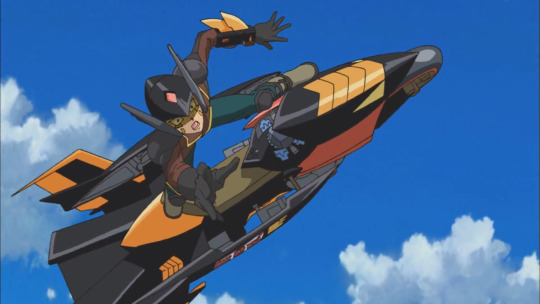
(Pictured: Bird Boy regretting all his life choices up until that point simultaneously.)
Here's the first moment I have to talk about in greater detail. See, the thing is, I don't know what the fandom consensus on Crow getting injured here is, but I argue that this moment was a (rare) strategic decision made by the writers at this point. Crow's injury accomplished several things: 1. It sets up the mystery of why his back wheel locked up out of nowhere, which is later paid off through Team Catastrophe's shenanigans. 2. It organically allows Aki to take his spot without introducing any argument about which of them is "worthier" of having that third spot. 3. Through this, it also allows him to actually bounce off Aki for once (a point I will come back to below, during the Team Catastrophe section). And 4. It allows the show to (TECHNICALLY) pay off the setup they did in letting Aki get her turbo duelling license and train with the boys. (Generally, Crow's and Aki's character writing intersects a bit during the pre-Diablo incident WRGP section, something I'll touch on below.)
Moreover, I think this is also the only match where they could have done something like this, and the reason for it is very simple: Team Unicorn are one-off opponents whose presence in the narrative is only relevant as far as it concerns the WRGP, and they are also one of the first teams the 5Ds gang faces. If we think about the opponents Team 5Ds has after this, it becomes very obvious why Crow could only be injured during this duel: If they had tried pulling this stunt later, it would have forced the writers to pull Aki centre stage during a much more plot-relevant duel than this one (which they were apparently allergic to, but let's not go there), not to speak of the fact that it would have forced them to sideline someone they were definitely trying to sell as the third portion of their protagonist trifecta, which would have probably been awkward. (If not for the fact that they literally did this to Crow later in the show, but I'll get there. Yes, I know there's a lot already that I'll still be "getting to".)
The thing is, whether or not it feels like an awkward writing choice to make so early in the big tournament of this arc (you be the judge of that), Crow's injury finally allows him to have a few interesting character moments for once. For one, there is his immediate disappointment about being forced to stay on the sidelines. Aside from the fact that this is a human and relatable reaction to his injury, it stings even more for the character than it does for us as the audience, because Crow got a moment where the Satellite orphans he previously took care of cheer him on for the tournament literally within the same two Team Unicorn preamble episodes.
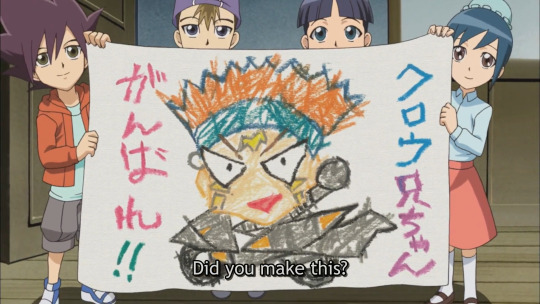
(Say what you will, this is just stupid cute.)
So when Aki eventually offers to take his place during the match, he's understandably apprehensive—and again, this is human. It may seem mean in the moment, but from a character writing standpoint, it's a natural response. Plus, it's certainly more interesting to watch the group have a bit of conflict among themselves, rather than everyone immediately jumping straight to acceptance. It introduces tension, and, for however brief a moment, raises the question of whether Crow might refuse to let Aki take his spot. This is also the point where Aki and Crow's character writing officially intertwines, at least for the stretch of episodes between the Team Unicorn duel and the Team Catastrophe duel. And you know what? Say what you will, but I think it does a world of good for both of them. The 5Ds cast, as lovely as it is, doesn't get a lot of room to bounce off one another where it concerns personal matters anymore, once the WRGP starts. Arguably, they get little time to bounce off one another outside of plot-related discussions at all once this portion of the show comes around. The characters are treated as "fully developed", and thus, the writing largely doesn't take the time to show us how the group naturally interacts with one another anymore, especially not with how many side characters (chiefly Bruno and Sherry), antagonists, and duels the show now has to juggle. So Aki and Crow getting even a smidgen of personal conflict here is honestly a breath of fresh air. The interaction kicked off by Crow's injury isn't completely plot-irrelevant, like most character interactions during the pre-WRGP were, but it's not something that feels like it's only there to explain the machinations of the antagonists to the audience, either.
Let me go through this in a little more detail to illustrate my point.
So, episode 97. Crow storms off after Aki offers to take his spot, while Aki heads out to prepare her runner, intent on helping her team. The personal motivations here are already very nice and reflective of these characters as we've gotten to know them up until this point: Crow's angry and disappointed (mostly at himself, which is noteworthy!) because he can't compete. And specifically, he's angry because not being able to compete in the first match means he can't show the kids his duelling like he wanted to. Then there's Aki, whose offer to take Crow's place is every bit as much of a strategic suggestion as it is a bid for acceptance from her. Acceptance, which is the thing she's been all about ever since she was introduced, basically. So she pleads with her friends to accept her, see her as an equal, and allow her to duel for the team, which they do. And Crow initially throws a fit, but then...
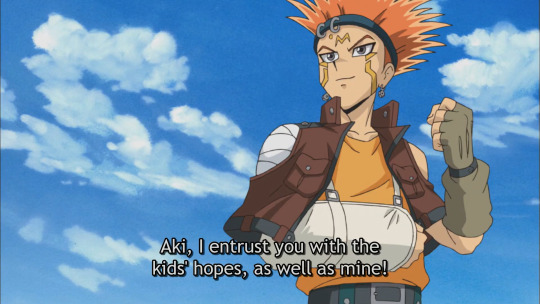
(Listen. You have no idea how much Crow and Aki getting to actually be friends means to me.)
He comes around to the idea and not only gives Aki his express permission to take his spot, he even coaches her a bit right before the match. Moreover, as his text states above, he literally entrusts her with the kids' hopes, as well as his own. This quickly brings both of them full circle: Crow, who already has a theme of legacy attached to him, passes the torch to Aki for this match, and in so doing, offers her the acceptance she asked her teammates for. (Frankly, stuff like this makes me wonder why on earth people were so eager to pit these two against each other, when their shared moments are actually some of the best-written during the often rocky WRGP arc.) So, though this injury pulls Crow out of the duel, it, funnily enough, ties him better into the story and to the other characters.
From there, we then dive into the Team Unicorn match proper. And well, being injured as he is, Crow doesn't exactly get a whole lot to do there. However, since we're in the portion where his and Aki's writing overlaps a bit, I do need to go on a quick tangent about what Aki's portion of this duel means for Crow.
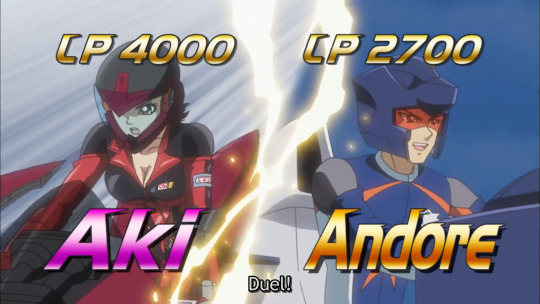
(Sigh. Okay, buckle up for a quick and rough detour.)
First, something I need to get out of the way and off my chest: I have made no secret out of the fact that I hate Aki's portion of this duel, save for the moment where she summons Stardust. Hell, this duel segment is pretty much universally hated by anone who has even a smidgen of sympathy for Aki. It's regarded by many as the very moment the writers axed Aki's character, and for good reason: After all the buildup surrounding her getting her turbo duelling license, the supposed "payoff" of it all is that she gets to duel against Andre for a depressing four turns before being defeated immediately, which leads into Yusei's frustrating portion of this duel, which, to my knowledge, isn't regarded any more kindly by fans than Aki's segment. It's a massive let-down, simply put. But the thing is, it's not just a let-down for Aki. After all, the brief character conflict she had with Crow about taking his spot here can and should be regarded as part of the setup for this moment, and as such, it can also be considered to be wasted the second Aki leaves the track after barely making an impact whatsoever.
However, I do need to mention that I have a theory on why this segment was handled the way it was, mostly because I feel like Crow's later interaction with Aki, shortly after she's out of the duel, underlines it (mind that this is just my personal theory, though, after having watched the show perhaps more times than can be considered sane): I think there is a cultural aspect to this duel. See, the word ganbaru, which anime subtitles often like to translate with "do your best" or something along the lines, has a greater significance than the translation implies. Though it's not inaccurate per se, there's more than just the idea of doing your best behind ganbaru, because it's something like an umbrella term not just for doing your best and succeeding, it's also the idea that you have to keep trying, even if you don't succeed. It's related to tenacity, to persistence, even in the face of terrible odds. And make no mistake, I don't mean the Japanese equivalent of "if at first you don't succeed, try again" here. I genuinely do mean "you have to keep trying, even if you fail". There is no guarantee of success here. And for that reason, the idea behind ganbaru is also that it's not simply the success that has value, but the effort made in the attempt to attain it, regardless of the result. (Side note: I tried to scrounge up a resource I could link to that nicely explains this concept, but unfortunately, all the promising articles were paywalled and the ones I learned it from require institutional access to lecture materials.) And this is where I will posit the tentative theory that this is exactly what the 5Ds writers were going for with Aki's segment of the duel—it was very much meant to be the payoff for her turbo duelling license setup and her plea to take Crow's place, but it wasn't so much her success that was meant to be valued, as the effort she (and by extension, Crow) made for and during this duel. And this is where Crow's little pep-talk with Aki after she's out of the duel comes in, because it feels like it supports exactly this interpretation:
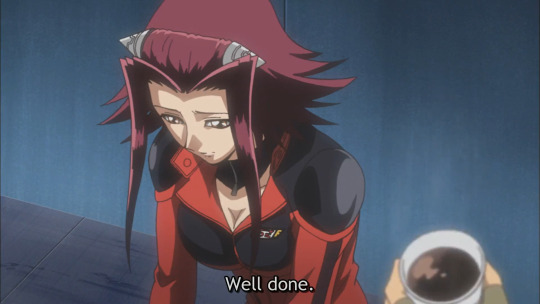
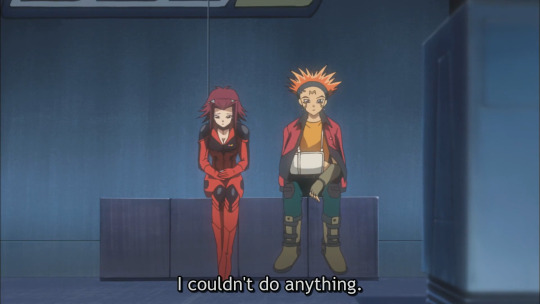
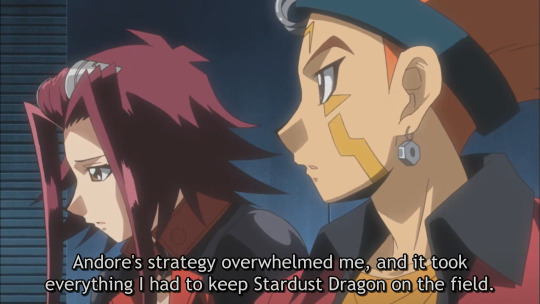
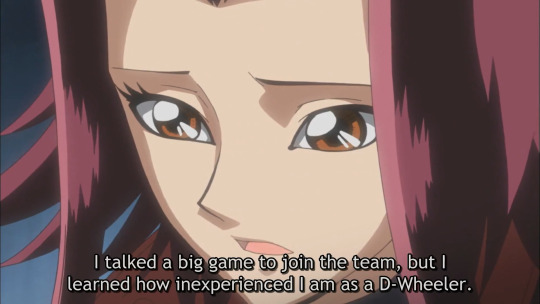
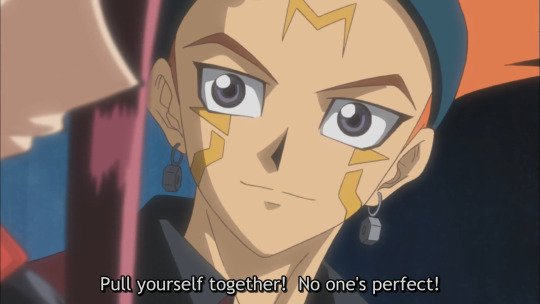


(This is essentially the whole sequence. Note how Crow, despite so fervently entrusting Aki with his and his kids' hopes prior, doesn't admonish her for making a bad showing in the slightest.)
I don't think it gets any clearer than it is here. During this sequence, Aki is painfully aware of how poor her performance was against Andre, especially after she was so insistent on duelling at first, and despite having been entrusted with Stardust by Yusei, to boot. Yet, Crow doesn't have a single word of criticism to offer her. Instead, he even tells her she did well and that nobody's perfect. It very much reads as valuing Aki's effort over the result she achieved to me, and thus seems perfectly in line with the idea behind ganbaru.
However, if we assume I'm correct about the intentions behind this writing choice, we come back to why Aki's segment of the duel is so hotly debated and why it may have arguably been a disservice not just to her, but to Crow, too, character-wise. Because the majority of non-Japanese watchers of the show culturally don't have a 1:1 applicable concept like ganbaru, this writing choice was more likely to fall flat for them, because to someone who wasn't raised to understand the idea behind it, Aki's portion of the duel doesn't register as a payoff; it registers as a massive disappointment, because it feels like the writers, who had so much setup already done for her, let her fail on purpose, just to later let Yusei attain his arguably dumbest victory of the entire show. Thus, they also essentially waste the conflict she had with Crow about whether she would be allowed to take his spot in the first place, because with how little she achieved during the duel, she may as well not have gotten on the track. (Figuratively speaking. Please Do Not take this to mean I would prefer a version where Aki hadn't duelled at all. That would be worse. It would be infinitely worse.)
(Also, side note: If this post reaches anyone who's actually Japanese and still remembers this duel, I would genuinely love your input on whether my interpretation is feasible or just wishful thinking. Did you interpret Aki's part of the duel the way I did here? Or did it fall flat for you, too? If what I'm saying here feels like an absolute reach, please tell me. I'm honestly just trying my best to make things make sense here and remembered this concept from some classes I took in Japanese studies at uni.)
With all that in mind, it doesn't come as a surprise that some people were just as frustrated with the way Crow was barred from duelling here as they were with Aki's segment or Yusei's later victory. But it is what it is—the Unicorn duel concludes the way we all know it to, and with that, the show begins setting up the following duel with Team Catastrophe.
The only other, non duel-related, noteworthy thing that happens between the Unicorn and the Catastrophe match is a brief appearance at the Poppo Time by Sherry, who admonishes the signers for celebrating their victory early and warns them about Iliaster. Why do I bring this up? Because it's one of less than five times that Crow is in the same room with Sherry. Remember, Sherry. The girl he later, during the finale, talks out of working for the big bad evil guy because he suddenly seems to have such a deep understanding of her motivations and character that he can accurately deduce what argument will make her understand that working with Z-ONE won't give her what she's looking for. So, does Crow get a meaningful interaction with her during this scene, then? Nope. Not even in the slightest. Crow says exactly one sentence that is aimed at Sherry during her appearance, and that sentence is this:
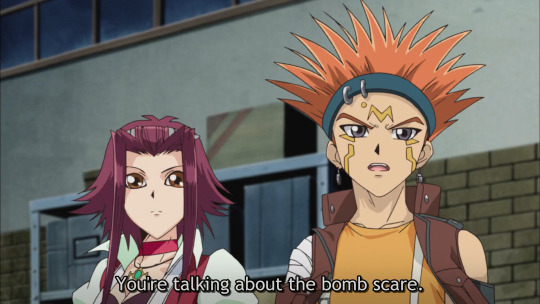
(What a meaningful conversation!)
And yes, I will come back to Crow and Sherry's dynamic in particular. But we'll save that for the Ark Cradle arc post. For now, just keep it in mind as we move along to the other WRGP duels.
So. Team Catasrophe.
During the duel against this team, which was previously only hinted at ominously, the writing for Crow and Aki overlaps again, and this starts with the writers essentially doing a complete switcheroo of what came before: Instead of Crow getting injured and being unable to compete, it's Aki who crashes, ends up in the hospital, and is thus forced to give up her spot during the duel. (This also goes hand in hand with her suddenly losing her powers, which we are given absolutely zero explanation for, but let's not talk about that clusterfuck here. If you're interested in my opinions about that particular trainwreck, I have a rant for you.) Additionally, it's during this stretch of episodes (103-105, which is a whopping four episodes less than Team Unicorn got) that we find out that not only Aki's crash, but Crow's previous one, too, were both sabotage, caused by the rather unscrupulous Team Catastrophe by way of a special card that can cause real damage even when there is no psychic duellist present. (A card we also find out was given to them by Placido/Primo, but this is irrelevant for both Aki and Crow.) Crow's reaction to this piece of information, particularly once Aki gets injured due to the same thing, is where things get interesting for him again, because he gets pissed, to say the least.

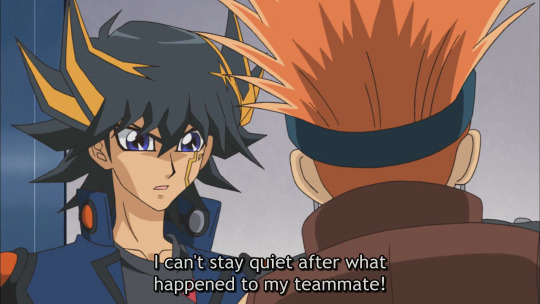
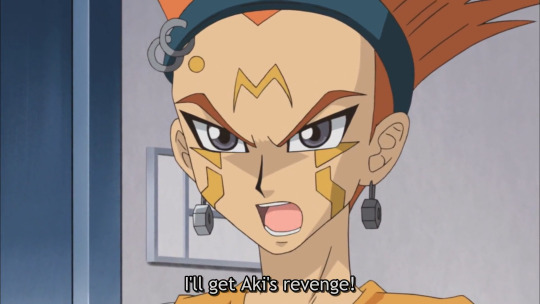
(A moment I imagine firebirdshippers must have been positively delighted about.)
Here, I have to reiterate an earlier point: Think what you will of Team Catastrophe, of Aki's crash, and of the sequence where her powers suddenly don't work, but this moment here, where Crow gets angry on her behalf and swears to duel Team Catastrophe into submission—not because he wants his kids to cheer for him, or because he wants to prove himself, but as revenge for his friend—is one of sadly only a handful of moments the writers use to show the strengthened relationships between the individual members of Team 5Ds after the dark signers arc. It's one of the precious few scenes that actually shows, rather than tells us or lets us search for scraps in the subtext, that the signers, and the members of Team 5Ds as a whole, care for each other outside of revolving around Yusei like planets around the sun. Even if it's laughably small, it's at least a hint that there are individual friendships between the other signers, too, that they all stick around one another for reasons beyond gravitating towards Yusei for one reason or another. And for that alone, I'm grateful that they put this here, even if Team Catastrophe was otherwise so ridiculous and made such a bad showing at their actual match that they could barely be taken seriously as antagonists at all.
Speaking of which. The actual meat of the matter. The Team Catastrophe match. What does Crow do here? Well, he duels! Even though he wasn't supposed to, for injury-related reasons. What both his participation as well as the actual duel accomplish, though, are that they not only showcase previously established character traits of Crow's again, but they also make a (possibly unintended) callback to a previous, major duel Crow took part in: His dark signer duel against Bommer/Greiger. Where and how? Let's see.
Firstly, Crow's participation. The reactions of the other characters to this make it very evident that Team 5Ds did not plan for this, with Yusei and Jack even going as far as to say they "had no choice" but to let Crow duel, because he insisted. This is perfectly in line with the stubbornness we already know from him at this point—a stubbornness that was also a major reason for why he took Bommer on and later continued his duel with said man, despite Yusei showing up and telling him he shouldn't be duelling a dark signer.
Secondly, there's the manoeuvring thing, and here's where I can call attention to a fun tidbit: The WRGP isn't what introduces the concept of manual mode during turbo duels to the audience. It's Crow. During his duel with Bommer. Being crafty and a bit shrewd as he is, Crow, during said duel in the DS arc, purposefully switches to manual mode when he duels Bommer, because he figures that attacks that can deal real damage can probably be evaded if you actually have control over your runner and aren't stuck in autopilot.

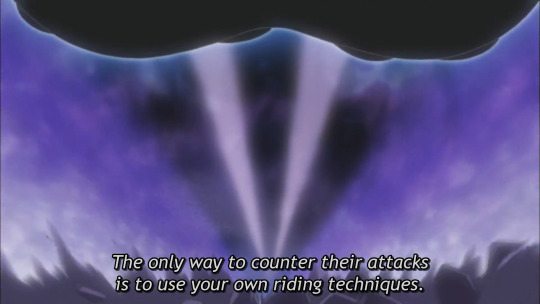
(Don't believe me? Here it is. And frankly, it is somewhat hilarious, yet also very fitting that Crow is the only one who thinks to do this during a duel with a dark signer.)
The reason this particular bit is relevant during the Team Catastrophe duel is because Crow essentially repeats this trick here. Of course, it's a bit less impactful now, given that manual mode is standard for WRGP duels, but still: Due to Hook, the Hidden Knight, Crow is forced to pay attention to the track and manually evade the monster's attempts to make his back wheel lock up during the duel, mirroring how he thought to manually evade Bommer's attacks during the DS arc.
Thirdly, there's the revenge angle, and this one is a particularly juicy callback. Remember, Crow's major reason for taking on Team Catastrophe, despite being injured, is that he wants to get revenge for Aki. This directly parallels how his major reason for duelling Bommer during the DS arc was that he wanted revenge for his kids, whom he believed to be dead at that point in time. (It also, interestingly, establishes a bit of a connection to his deck, which boasts a fair amount of revenge effects, but I'll not get into that here, seeing as I've talked about Crow's cards a bit before.)
Keep in mind, despite all the things listed above that this duel accomplishes, it's also by far the shortest WRGP duel. It lasts a whole six turns, total, which is ludicrous compared to the likes of 27-turn Team Unicorn, 26-turn Team Taiyou, or 25-turn Team Ragnarok. And I don't think it's controversial to say that the Catastrophe guys are probably the most forgettable WRGP Team, too. Yet, somehow, despite all its shortcomings in terms of memorable antagonists and plot relevance, this is one of the best duels of the WRGP where Crow's character writing is concerned. Now, I'll be perfectly candid: Coming into this post, I did not expect the Team Catastrophe duel, of all things, to end up being as good at actually showcasing Crow's character and his ties to other characters (who aren't Yusei) as it was, but here we are. And we had better hold on to the good the Team Unicorn - Catastrophe segment did for Crow, because the next thing that's coming up is a harsh break from the WRGP, starting with the sudden appearance of Placido's home-engineered army of killer duel robots. And what does Crow get to do during this part?
Uh. Well.
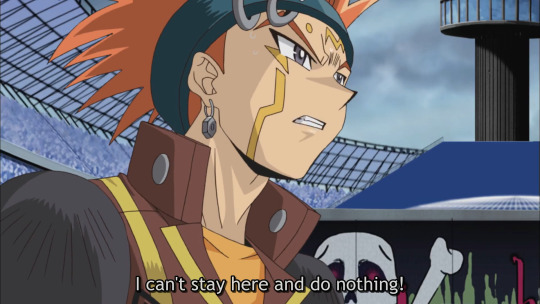
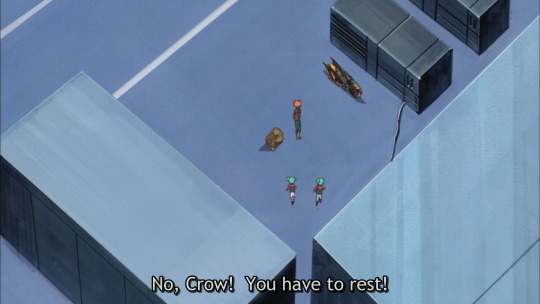
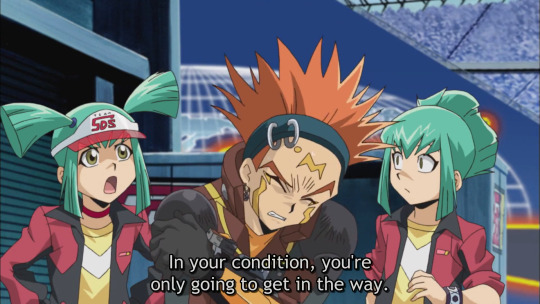
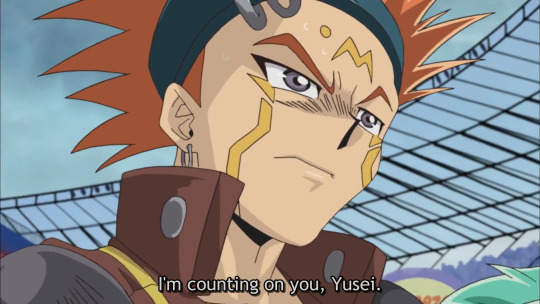
(Pictured: Bird Boy being demoted to benchwarmer while the city's being ransacked by murder duel robots.)
Nothing. A whole lot of nothing, is what.
During the duel robot invasion, we only ever flash back to Crow to ascertain that he is, in fact, useless during this part of the show, something he shares in common with Ruka, Rua, and Aki here, because all of them get pretty much nothing to do while Yusei finally gets the hang of accel synchro. Granted, Aki gets to save a little girl at the hospital, but in comparison to Yusei's lengthy, plot-heavy duel with Placido, this feels like a consolation prize. And for once, Jack is only marginally better off, too, because sure, he gets to beat up a couple of robots, but that's it, really.
Where Crow is concerned, his plot relevance doesn't actually resume once the Placido duel finishes, though. (And neither does Rua's, Ruka's, or Aki's, while we're at it.) Because wouldn't you know it, the next big thing directly after the duel robot invasion are the Red Nova episodes, where three out of five signers (Crow, Aki, and Ruka, unsurprisingly) are removed from the screen almost in their entirety again while Jack gets his much-needed dragon upgrade so he can keep up with Yusei, in order to uphold his status as a classic, almost-evenly-matched yugioh rival.
Speaking of upgrades and dragons, let's make a quick detour while our protag and rival duo take their express vacation to the Nazca plains. It is, of course, no secret that no signer outside of Yusei and Jack ever got a dragon upgrade within the anime. (No, I'm not forgetting about Life Stream Dragon. But that one, unlike Shooting Star Dragon and Red Nova Dragon, was a.) teased all the way back in the DS arc and b.) didn't have a unique summoning method or some other gimmick that made it an "elevated" synchro. So I'm discounting Life Stream as a "proper" dragon upgrade on purpose.) Is this the point where I start arguing that Crow should have gotten one, then? Well, not quite. Not with the writing the show canonically gave us, at least—after all, with how late Black-Winged Dragon was introduced, it would have been bonkers to upgrade him here already, if even at all. However, I do argue that the way the show hands only Yusei and Jack upgrades seems a bit... off. Now, I know why only those two get upgrades, or at least I think I do. After all, they're the central protag/rival duo, and within the framework of the character archetypes the larger yugioh canon has created for itself, this would have always made them the first, if not the only candidates for dragon upgrades. What feels a bit off to me, though, is that specifically the 5Ds cast feels like it... chafes a bit against those character archetypes, for lack of a better word. The problem is this: The signers, as far as the first two arcs are concerned, are sold to us as equals who all have very powerful ace monsters. Yes, Jack and Yusei are still undoubtedly the best duellists among them, but not on account of having uber-powerful extra special monsters that were acquired through supernatural means that are categorically inaccessible to the other signers. However, with the appearance of Shooting Star and Red Nova, this changes. While Yusei and Jack were previously and would have always been the two guys who had a Special dynamic with a capital "S" on account of their character archetypes, their acquisition of the dragon upgrades—and even more so, the lack of upgrades their fellow signers receive—now decidedly puts them in a different power bracket and skews the balance between previous, supposedly "equal" characters. (Which, unfortunately, is yet another thing that makes everyone else easier to sideline.)
Why do I bring all this up in a post dedicated to Crow? Because this new power imbalance arguably impacts him more than the other signers—because he's Team 5Ds' second wheeler and doesn't miss another WRGP match from here on out. Thus, that power imbalance is felt in the upcoming duels, where Yusei and Jack bust out Shooting Star and Red Nova like it's nothing, while Crow is left manoeuvring with the somewhat underpowered Black-Winged Dragon and whatever else he can come up with. This is also why I claimed that the show did sideline Crow in some aspects further above. Because while some parts of his writing go to great pains to establish him as part of a protagonist trifecta that is now supposed to take centre stage before the other characters, he also permanently lives in Jack and Yusei's shadow, ultimately barred not just from reaching equal status as a signer (due to his late and rocky introduction and dragon acquisition), but also barred from becoming the equal of his foster brothers as a duellist. Frankly, I'm surprised the show didn't make this a plot point, because the first thing my mind jumps to when I think about this is whether Crow felt left behind after his brothers acquired such immensely powerful, special cards. But more on my personal writing ideas later. For now, let's just put a pin in the power-imbalance thing.
So, when is Crow back on screen in any meaningful role, then? (Note that I mean this as literally as possible. As per my discussion about "screentime" and my gripes about it in part two, I gloss over the parts where Crow is on screen, but could be traded for any other signer or even a lamppost without affecting the scene at all.)
Well, the next thing Crow gets to do isn't exactly glorious, but it sure is funny.
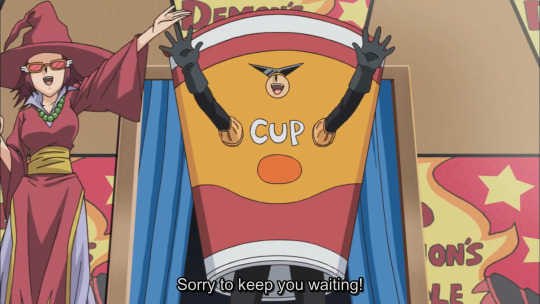
(I want you all to remember that he has to wear this costume and play this part in Team 5Ds' absurd plan to capture Yaeger/Lazar because he lost at rock-paper-scissors. This will never not be funny to me.)
Ignoring the hilarious outfit and Crow playing the bait at a fabricated cup ramen promo event meant to lure Yaeger in, bird boy does actually get something that's not just for funsies to do during the two episodes where Team 5Ds is trying to get more information about Iliaster: He gets to have a duel revanche against Yaeger, who, if we remember the DS arc, ditched him the last time they squared off. Much like the Team Catastrophe duel, this one, too, calls back to previous duels Crow has had: For one, it's the obvious conclusion to his unfinished, first duel with Yaeger. And for two, Crow repeats a "trick" (for lack of a better term) here that is also unique to him: losing on purpose, which we remember from his duel with Lyndon.
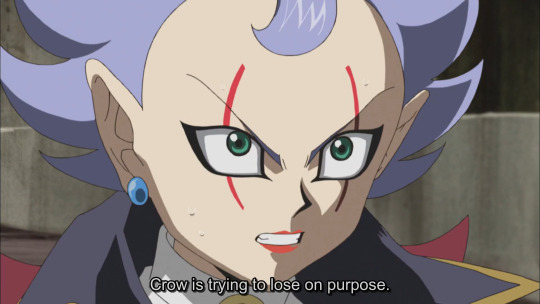
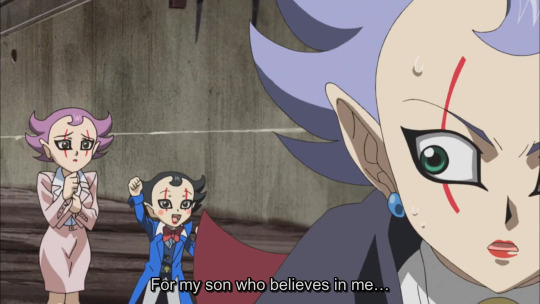
(Identical-looking clown family jumpscare be upon ye.)
And again, much like getting injured for the Team Unicorn duel, I argue that this story beat here is something that could also only have been accomplished with Crow. Because he's the only one who has previously duelled Yaeger, firstly, because not wanting to make a child cry by beating their dad in a duel makes sense for him as a character due to him being a family-oriented person who loves children, secondly, and because losing on purpose in this scenario is a tactic that would seem out of character from anyone else, thirdly. (We recall, the only times Jack and Yusei, respectively, ever consider/offer to lose on purpose is when the lives of people close to them are on the line, in the shape of Carly/Rally. As for the others, aside from not being present, Aki, Rua, and Ruka are so heavily sidelined at this point that they would have never been an option for this. And if his writing is anything to go by, Bruno is mostly purposefully forbidden from accomplishing Plot Things, especially through duels, while he's Bruno.) But hey, due to the way this episode is set up, losing on purpose works out for Crow, because it convinces Yaeger to stop hiding and actually share his knowledge about Iliaster. This, by the way, is the second scene where Crow gets to be in a room with Sherry for a longer stretch of time. And look, him joking that Sherry might kill Yaeger if he doesn't spill the beans about Iliaster soon is fun and all, but in light of the Ark Cradle duel later, I have to point out that he, again, doesn't get to have so much as a shred of a meaningful conversation with Sherry here. Again. But moving on. The scene with Yaeger at the Poppo Time then leads us first to the small sequence in the arcade where the gang has to win a simulated duel to get Yaeger's encoded intel, then to episode 116—the Moment Express episode, where, due to this being a Yusei, Sherry, and Bruno-focussed episode, Crow gets nothing to do again. (And also doesn't get to interact with Sherry again.)
Congrats! We've survived the WRGP break. This leaves us with three more WRGP duels before shit hits the fan and the Ark Cradle arc commences. And full disclosure, I'll be doing a bit of a quick-fire round of those three duels. Why? Because despite them all having their merits in their own rights (they're the better liked duels of the WRGP for a reason), there honestly isn't that much focus on Crow during them. He duels, yes, and I've seen people point this out over and over again as the supposed smoking gun that shows how Crow had so much more relevance and screentime than Aki and yadda, yadda. We've been there. And it's not that I can't see where this argument is coming from—I'll be the first to tell you that it's a travesty that Aki never got to duel in the WRGP again outside of the Unicorn match. But I want to use the final three matches to dig into how the way these matches—and especially the opponents to go with them—were set up made it nearly impossible for Aki to replace Crow again during any point of the WRGP finals.
First, episode 118. This is the only preamble episode we get for the first two WRGP finals teams, and here, our group is split in two: Yusei, Bruno, and Rua introduce us to Team Taiyou, while Jack, Aki, and Crow introduce us to Team Ragnarok. There isn't much to say here, because the only thing this episode does for Crow is a shallow repeat of what the Team Catastrophe duel did: By putting him in a group with Aki and Jack, and letting them decide among themselves, independently, to check out the exhibition match, it implies that he voluntarily spends time with signers who aren't Yusei. Thumbs up. Gold star. You made an effort (I guess). Then, the real fun starts.
Round one. Team Taiyou.
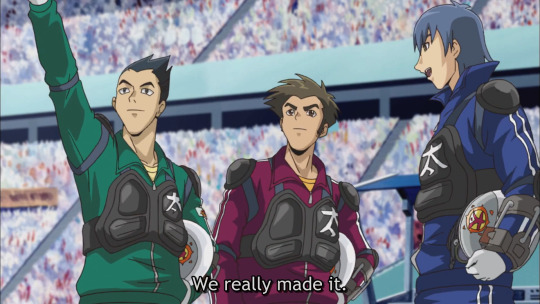
(Pictured: The sweetest country bumpkins to ever grace this earth. Yes, I'm biased.)
So here's the deal with Team Taiyou, from a narrative standpoint, as best as I can grasp it: They are a callback to Team 5Ds' roots. Specifically, to the boys' Satellite roots. The Taiyou boys come from humble origins, have only one, mostly home-engineered duel runner, and play using old cards that are widely considered shitty, as 5Ds canon tells us. They are essentially the non-signer, countryside version of what Jack, Crow, and Yusei once were, which is why this is the first duel where the duellist constellation on Team 5Ds' end couldn't possibly have been altered. Team Taiyou is there to remind us where our boys started, so it has to be our boys duelling them. This also goes for Crow, even though this duel otherwise doesn't accomplish much for him, character-wise. Instead, it's more of a narrative wink at the audience, as well as providing a breather between otherwise extremely tense, plot-focussed duels. But yeah, Crow's part in this match isn't much to write home about; he doesn't get any verbal interactions that are very meaningful to his character, can't get so much as a scratch in on Zushin, even with Black-Winged Dragon, and is defeated so Yusei can take out the legendary giant.
Round two. Team Ragnarok.

(Behold the pizzazz of at least two contenders for Haircuts With The Most Spikes in the show.)
Though this duel is framed as being even more so aimed towards bolstering Jack's character writing than Crow's, given the inclusion of Dragan's personal history with Jack, Team Ragnarok gets significantly more interesting for Crow again than Team Taiyou did. This is, of course, mainly because of Brave/Broder. Where Team Taiyou were a callback to the 5Ds boys' roots, Team Ragnarok are their narrative foils. Dragan is the duellist who lost his pride to contrast Jack, who's brimming with pride at all times, and Harald/Halldor is essentially the rich, "destiny isn't bullshit, actually" version of Yusei. Meanwhile, unlike the first two, who highlight our 5Ds boys' characteristics by contrasting them, Brave acts as Crow's mirror. Through Team Ragnarok's flashbacks, we see that he gets almost exactly the same, lovable-rogue-type backstory that Crow did during the DS arc, just in a different setting. The only, major difference between them is that while Crow is more down-to-earth, Brave likes to be pretty flashy.
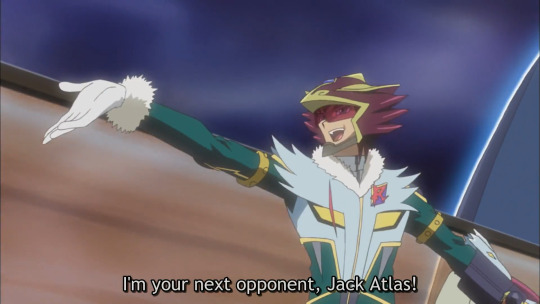
(Keep in mind that he's doing this on a runner. Is there such a thing as courses on how to do acrobatics on your runner? Like there are courses for vaulting on horseback irl? I'm overthinking this again.)
Unsurprisingly, the duel thus ends up addressing the similarities between Crow and Brave, mostly through two things: One, the duel essentially becomes a contest of who can out-trickster who, culminating in the famous, ridiculous-in-the-good-way sequence where Crow activates a trap from his graveyard, to the shock of pretty much everyone present. And two, despite being on opposite sides, the two bond over their concern for the children they took care of and their concern for children in general, which is expressed most clearly in the scene where Crow's kids, in an attempt to hold the poster they made for him higher, very nearly fall over the barricade in the WRGP stands. Despite the hefty length of the full duel, these are pretty much the only things actually related to Crow's character that come up, though. They're good, don't get me wrong, but in a duel that is otherwise this dense with plot, Aesir shenanigans, and Iliaster foreshadowing, it's no surprise that the duel doesn't add that much to Crow's character, outside of giving him someone he can bounce off very well and relate to. Again, though, we are faced with the same situation as with Team Taiyou: Due to the way the members of Team Ragnarok are written, meant to contrast/parallel one male duellist each from Team 5Ds, nobody other than Crow could have taken the third spot here, either. It would have felt awkward from a narrative standpoint (as much as I would have loved to see Aki duel more).
Now, finally. Round three. Team New World.
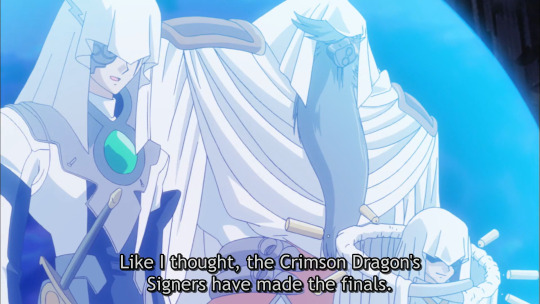
(Welp. Here come the robots.)
I had to check to make sure I wasn't misremembering this, but due to the way this duel was set up so José/Jakob could bust out Meklord Emperor Granel with a ridiculous amount of attack points, Crow gets a resounding four turns total in this duel. (Gee, I wonder which other character got this treatment during a WRGP duel.) During those four turns, there are only two things he accomplishes: One, leaving behind two combo pieces Yusei later uses, and two, showcasing the shrewd tactics that earned him the label of "trickster" during the Ragnarok duel by bringing out a non-synchro monster that can take advantage of a synchro monster's attack points and effects—Aurora the Northern Lights. And arguably, this is a very smart play, moreover, it's the only time anyone in the show has the bright idea to not use synchro monsters against the known and feared synchro-killer Meklords. Unfortunately, as smart as it is, the narrative doesn't reward Crow for this play—José all but shrugs what could have been a turning point in the duel off, then proceeds to steamroll Crow the next turn, leaving Yusei to score the win, as usual. To get back to the "Crow got so much more screentime than Aki during the WRGP" thing for a second, of all the duels in the WRGP finals, this is arguably the one where Aki could still most easily have taken Crow's spot again, because here, it doesn't matter whether it's him or someone else, as this duel isn't tied to his character in any way. Unfortunately, due to the Granel-steamroller-strategy, this is also the duel where letting Aki take his spot again would have been the biggest shot in the foot, because unless they had changed Team New World's strategy, Aki would have gotten brutally guillotined here, same as Crow—something I can't imagine anyone, not even people who hate Crow, being happy about.
With that, though, we've finally made it through the WRGP. So, what's the bottom line here? Frankly, speaking from my own interpretation, Crow occupies an... odd spot during this tournament, to say the least. Though he does get to duel the majority of the time, few of the duels actually cater to his character in any way. Moreover, he only gets to be the star of the show in a WRGP duel once, during the by far most forgettable match against Team Catastrophe. And mind that I use the term "star of the show" very loosely here, because the problem the WRGP arc as a whole has, in my opinion, is that the rather lame Team Catastrophe duel is the only one in the whole tournament that isn't won by Yusei, which categorically means that any of the other character's big moments are usually undermined by the fact that they ultimately still need him to save the day. Thus, moments like Aki summoning Stardust Dragon and Crow using an anti-synchro-killer strategy that for once actually forgoes synchros are somewhat cheapened by the fact that they're not actually the turning-point moments they're initially painted as, because ultimately, Yusei always has to be the one to save the day. What's worse is that this almost feels like a bit of a non-issue that could have easily been fixed—given that the show tells us that teams can shuffle around their line-up for a match any time. But unfortunately, the writing never interacts with this as a possible strategic element, nor does it ever seem to consider letting Yusei lose, or forcing him to give up his spot for a match. I feel the need to say that I don't put the blame at Yusei's feet here, though: This strongly feels like an oversight by the writers, and perhaps a disproportionate need to have a nigh-infallible protagonist (on the duelling side of things) that their audience would never run the risk of calling "lame". For Crow, though, this chiefly means one thing: In any duel other than the Catastrophe one, it was always clear that even if he partook, he would never finish the match. And yes, this is technically an issue Jack has, too. But this is where the character writing outside of the duels comes into play, too.
Unlike Jack, who actually gets to do something during the Diablo invasion (albeit very little), who gets his very own dragon upgrade and who gets a very personal, pre-duel plot with Dragan, the show's writing doesn't bother giving Crow a lot of plot- or character-relevant things to do, once the WRGP starts. This is also why I was so surprised at how much the Unicorn and Catastrophe duels embrace his interactions with Aki—compared to the later duels in the finals, this portion still makes Crow feel genuinely relevant and interwoven with the other characters. Meanwhile, out of the three final duels, only the Ragnarok one actually tries to establish a connection to his characterisation, through Brave. The Taiyou duel only sets itself up in such a way that Aki partaking instead of him would have been awkward. Meanwhile, the New World duel just has him being treated like a floormat in a sad parallel to Aki during the Unicorn duel, seeing as they both get a nice moment where it looks like they might turn the duel around (Aki summoning Stardust Dragon and Black Rose Dragon onto the field at the same time; Crow summoning Aurora the Northern Lights, which couldn't be absorbed by the Meklords), only to have their hopes dashed as they're mercilessly cleared off the track. Outside of the duels, many scenes sadly give the impression that they may as well not have included Crow, though—he often gets so little to contribute to a moment or even to say at all that substituting him with a cardboard box seems like it would not have impacted the scene in any way. And that's without addressing his non-existent connection to Sherry, which feels extra glaring, given his later interactions with her on the Ark Cradle.
All in all, the WRGP feels like a very mixed bag, where Crow's character writing is concerned. His belated backstory, which I talked about in part two, is front-loaded and asks as many questions as it answers. Then the tournament commences, gives him some actually decent character interplay with Aki for once (at the cost of letting her succeed in the tournament, it seems), only for him to be basically irrelevant during the WRGP pause again. And once the whole thing resumes, it becomes this hot-and-cold thing where some duel aspects seem tailored to him, while others treat him as completely expendable. The end result is an arc where I'm left wondering why exactly the writers felt the need to make it seem like Crow made up one portion of a protagonist trifecta, if they never actually bothered treating him as equal to the other two. (The answer, I believe, lies somewhere between the fumbled setup they did for him during the Fortune Cup and DS arc, and the way yugioh in general treats its character archetypes. But that's just speculation on my part.) The one, saving grace the WRGP (outside of the Pearson backstory) has for Crow is that it at least doesn't introduce any new character- and/or timeline inconsistencies. In fact, his character stays remarkably true to form once the tournament begins.
Okay, onto the final bit, then. As I've done in both previous posts, let me delve into completely subjective territory and offer some ideas on how this arc could have been handled to make it seem a little less all over the place with Crow. And since his writing here canonically intersects with Aki's several times, let me try to do it while offering the best of both worlds to both characters, if I can.
As far as Crow's backstory is concerned, I've already offered my solutions to that in part two. Now, to stay consistent with my own suggestions, I'll try to branch off what I wrote in the last post. This means that, as per my previous two analyses, we're dealing with two scenarios again: One, Crow stays a signer and we try to touch canon as little as possible. Two, Crow isn't a signer and we adjust canon in whatever way we need to to make him feel interesting and necessary despite/because of that.
First, though, let's get two adjustments I personally would have made in both versions out of the way:
The way the WRGP is structured puts every character that isn't Yusei at a massive disadvantage, where character moments in duels are concerned. Thus, I propose an overhaul. Among the changes I think could have benefitted the characters (yes, all of them) are: One - Aki actually getting to accomplish something during the Unicorn duel (she can and should still have her moments with Crow, but maybe let her portion of the duel end in her thanking him for coaching her, creating a more upbeat scene that strengthens their friendship, which could double as good setup for their later double-duel against Sherry). Two - letting the Team Catastrophe duel actually play out properly (as in, they become more meaningful as opponents by having a better strategy, for example, and Crow could stick it out longer against them, in order to make this more so his win than Jack's. Also, why not let Aki actually see him get back at Team Catastrophe for her?). Three - giving Crow an actual character moment during the Taiyou duel (what if one of the country boys had played a card or two of the ones he learned to read from? It could have helped drive the parallel between the two teams home.) Four - letting Crow's anti-Meklord strategy get at least a little payoff, if only for two turns (show us at least proof of concept, damn it!). Yes, the Ragnarok duel is the only one I wouldn't rewrite (unless special circumstances are introduced, see below). Additionally, let Team 5Ds alter their line-up more than once, damn it. Let them actually strategise about the duels, let them take into consideration who should go first when and whose deck might be better suited to which scenario. Also, remove Yusei from at least one duel. Doesn't matter how, just let him not partake once. Perfect setup to let Aki duel again, and would also allow for spicy character interactions. (Arguably the best duels where this could have been done would have been any of the final duels, though it would have also required rewriting the antagonists somewhat in any case.)
For the love of god, give Sherry and Crow some setup. Let them actually interact, let them introduce their philosophies to one another, just do something, anything to make Crow understanding and talking sense into her during the finale seem earned. A few chance meetings, or maybe even a tiny side-plot could have done so much here. And if you can't let them interact outright, at least let Aki and Crow talk about Sherry! Double whammy! The two characters who end up duelling against her are made to seem even more like a team, and Crow actually gets to find out what Sherry's deal is on-screen. Just. Set. it. up. I beg you.
There we go. Now, onto the two branches.
Option A: Crow stays a signer and obtained Black-Winged Dragon.
Seeing as Crow's signer status, funnily enough, isn't all that relevant during the tournament itself (save for two notable exceptions), there aren't that many fixes to be made here. Crow can still get injured, miss out on the Unicorn duel and be the star of the Catastrophe duel. But giving him something to do during the duel robot invasion that isn't standing around and hoping Yusei will fix everything would also be nice. It's fine if he can't drive out there and duel, but why not let him do something else? He's a crafty guy, why not let him find, say, a way to fry the Diablos' runners, taking a few of them out even from a semi-stationary position without duelling them? He could at least get as much of a consolation prize scene as Aki got with her saving that child. Then there's Team Taiyou, which, save for what I proposed above, is a duel that doesn't feel like it needs changes. Crow does his thing here. That's it. The same goes for Team Ragnarok, especially given that they're specifically written to oppose an all-signers Team 5Ds. Finally, there's Team New World, which, if I'm being completely candid, I would personally overhaul to change the cyborgs' strategy entirely in order to actually let all three members of Team 5Ds shine. But this is the version where I touch canon as little as possible, so... Aside from what I wrote above, no changes needed. Just make Crow seem a little more relevant, make his strategy have at least a little payoff, even if Granel's back out and menacing literally two turns later.
Option B: Crow, as per my previous posts, isn't a signer and doesn't have Black-Winged Dragon.
This is the version that would categorically require heavier changes, though they honestly don't arrive until the break in the tournament. Unicorn and Catastrophe stay the same, I would still propose that Crow gets to be a little more useful during the Diablo invasion. But! In this version, seeing as he never acquired BWD, the break in the WRGP would be an excellent spot to let Crow acquire an upgrade for his beefy Blackwing ace monster of choice. Give him a little side-plot, too, something to do, something where he proves himself. Maybe let him run into Iliaster here, or maybe call back to Pearson again and introduce the new Blackwing upgrade as a treasure Pearson stashed away before he died (maybe this could have even been the card Bolger was actually after; the world is our oyster here). Then he's beefed up, too, and actually feels a little more on the same level as Jack and Yusei. The tournament recommences and again, the Taiyou duel could stay mostly the same, I think. Ragnarok and New World are where it gets really interesting, though. The way I see it, Ragnarok could go two ways with Crow not being a signer: Either he partakes as he did in canon and his non-signer status is called out as a peculiarity by our Swedish boys who happen to be obsessed with fate (which would make his performance against Brave seem all the more impressive), or, due to this being a duel all about destiny and celestial pissing contests, Crow's spot is given to Aki again for this duel due to her signer status (this would, obviously, require rewriting Brave, perhaps even switching him out for a Ragnarok lady instead). As for Team New World, this duel would honestly be a lot more juicy with a non-signer Crow, because much like he was for the dark signers, a non-signer Crow would essentially be an unknown in their plan for the cyborgs. He would be the guy who's Not Supposed To Be Here. Granted, he would still be beaten, but he could still get an excellent moment where his out-of-left-field anti-Meklord strategy genuinely seems to turn the tables for a bit, angering José and providing even stronger setup for Yusei to win later.
Aaaaand that's that. Somehow, I get the feeling the WRGP had the least things that needed fixing because it also had the least actual character writing. But that might just be me. It's late and I have been writing for A While. But hey, I got out part three faster than part two! I consider that an achievement.
Now, while I get my talking points in order for part four, I hope you'll have fun chewing on this one. See you in the grand finale to my Bird Boy dissertation.
#yugioh 5ds#crow hogan#ygo 5ds#5ds#yugioh meta#team unicorn#team catastrophe#team taiyou#team ragnarok#team new world#holy shit my brain is smoking#so. much. stuff to talk about.#the irony that I'm posting an analysis of this length about crow#on a blog with an aki theme is not lost on me#listen I love them both. they are so good.#and tbh I think I made it abundantly clear that I do here#they are friends. they don't need to fight.#also again if anyone wants to use my fix suggestions as fic premises#please do and tag me if you publish it#anyway *yeets this out into the wild* take it
45 notes
·
View notes
Text
going to chb must be crazy like imagine sharing a camp with
-one of the strongest demigods ever who's saved the world like at least 3 times, fought multiple gods & titans and WON (and is a tartarus survivor)
-the literal main architect of OLYMPUS who's also saved the world multiple times (also tartarus survivor)
-THE lord of the wild who's also close friends with the first two (and has helped save the world multiple times)
-an emo kid from the 1930s who again helped save the world and is also a tartarus survivor (TWICE)
-a son of apollo who survived tartarus with nothing but cargo shorts and sheer will (pun intended)
-the main designer and builder for the argo II, also the first hephaestus kid to have fire powers since hundreds of years ago (did i mention killed gaea? no? yeah he did that too)
-a girl who somehow charmspeak-ed gaea into falling back asleep (also side note daughter of super famous actor because why not)
-pretty much everybody is a two-time war veteran
-THE GOD APOLLO who just sometimes comes down to visit in the form of a teenage boy
-did i mention dionysus, god of wine madness and theatre
-also chiron, trainer of pretty much every greek hero ever
#shit's crazy#theyre basically living history#percy is kinda the new hercules except less macho manly man#'oh who's killed this guy before' 'percy jackson'#like can you imagine playing capture the flag with rhese bastards#ur scaling the wall and you see these mfs make it up there in like 2 jumps#they arent allowed to be in the same team for any of the games because you KNOW theyd beat everyone else's asses#people are fighting to have percy on their team#not to mention the gods that just pop in for a visit every now and then#like at this point the fact that DIONYSUS is their camp counselor isnr even that surprising anymore#some scrawny teen dude shows up and will's just 'oh hey dad'#'YOU MEAN APOLLO????' 'yeah lol he just visits sometimes'#pretty much everyone there has survived at least one war#the background characters must feel hella overshadowed bcs what does it matter if u won a game when the guy in the cabin across has like#saved the world. 3 different times. like wtf#pjo books#leo valdez#trials of apollo#lester papadopoulos#pjo fandom#percy jackson#grover underwood#nico di angelo#annabeth chase#pjo hoo toa#heroes of olympus#piper mclean#chiron#camp half blood#pjo text post
7K notes
·
View notes
Text
Prompt 225
Klarion is EXCITED. He's absolutely DELIGHTED even, unable to sit still as he flits from place to place. His baby cousin! Is! Visiting!
Which OBVIOUSLY means he, as the older one, must make sure the main places are still standing so he can show his itty bitty baby cousin EVERYTHING!
After all, he's never gotten to be the older one! He's always been the youngest in the family! But now he has an itty bitty toddler cousin- form recently shifted to match- to teach the ways of Chaos to! He's so EXCITED!
The League and heroes on the other hand, are Very concerned about Why the Witch Boy has been spotted in practically every major city in the US in the last few days. What is he planning?!
#prompts#dcxdp#dpxdc#klarion the witch boy#Danny fenton#Chaos & Clockwork are twin primordials#Danny might be stuck in this toddler form while he grows up again but this won't stop him#He is down for playing with his new cousin- aka causing mischief & exploring#Klarion is the realms equivalent of a 6 year old#Chaos has a very hands off approach to parenting while CW looks like he has a hands off approach#He is in fact a bit of a helicopter parent just via looking through mirrors#Danny is his first ghostling and look at all the danger he's gotten into at the fetus age of 3#He has a right to worry!#DC world is the equivalent of a playground for primordial beings to let their kids run around in#At least that's how they see it#Ghosts fight for playing so that's what Klarion does with the league kid/teen teams lol#There has been many a miscommunication due to most entities avoiding Realms beings like the plagues#space core danny#DANNY IS NOT GHOST KING
2K notes
·
View notes
Text

haha turned them into popsicel
what flavor do u think they are… find out next time I respawn. Okay.
#tf2#tf2 fanart#tf2 scout#tf2 pyro#tf2 soldier#tf2 demoman#tf2 heavy#tf2 engineer#tf2 sniper#tf2 spy#tf2 medic#team fortress 2#tf2 art#tf2 whole team#ruths doodles#ouuhggh the summer is almost gone#the horrible schooling arrives. Terrible news. I hate it there.#I wish they had tf2 school where you learn about tf2. yeaahg.#what a beautiful world I conjure up#too bad I will have to scrounge the wiki all by my lonesome. SAD.#I need a bad bitch (someone who is as autistic about tf2 as I am)
882 notes
·
View notes
Text
DP X DC PROMPT #28
(#) = Notes at the end of post
✦
Chartreuse
Due to the high levels of ambient ectoplasm, all the citizens of Amity Park gained a permanent change in eye color. They don't glow or flare in response to rampant emotions like true ghosts or the halfas though. They're just an unnaturally bright yellow-green.
The thing is, nobody else on Earth has this eye color, and it's never been seen in the human race until the recently graduated Amity Parkers started branching out to other cities to find jobs.
Nobody paid this any mind at first, though. Many just thought the individuals liked strangely colored contacts or it was a trick of the light. It's not until Danny and Tucker are both hired for positions in Wayne Enterprises that questions start popping up.
At first, the other employees thought the two might be related. It could happen, it's not that strange. However, when both of them said they're nowhere near related, just childhood best friends, it left everyone confused. If they aren't related and they aren't wearing colored contacts, then what are the odds of too completely unrelated people having the exact same strange and unseen eye color?
After a while, everyone just stops asking questions. After all, both men are easy to get along with and are excellent at their jobs, so a strange eye color isn't really something to complain about. Their stares were just a bit more intense than most people, and honestly, they've seen stranger things.
It helps that they've started seeing other people with the same eye color popping up in celebrity, sports, and activist circles. (1)
However, It's not until the power goes out during a late meeting/presentation, and Tim Drake accidentally turns on and shines his cell phone light into Tuckers eyes, that he starts seriously digging.
Needless to say, the animal-like green shine of his pupils scared the shit out of him and got him wondering if two of his new employees were part of a previously unknown alien race that'd recently settled on Earth without anyone noticing. When he looks into the middle of nowhere town they came from, this idea is even further cemented when he sees every person he finds a photo of have the exact same shade of chartreuse eyes. Ignoring the ghost rumors and "sightings" as just a strange tourist trap for the strange little town to make extra income, he brings the info he found to the other bats and birds.
They aren't exactly welcomed when they go snooping around Amity Park, unfortunately... (2 & 3)
✦
Now. To make this a bit more cracky, when confronted, do Danny and Tucker just come clean or do they milk the idea of them being aliens for all it's worth? (4) Add in a few strange, but perfectly normal for them, things they do that have people scratching their heads and make the assumption even worse/more irrefutable. This includes the unexplainable eye shine Tim discovered.
✦
(1) Paulina became a supermodel and is coveted for her striking eye color and beautiful complexion. Dash became a coach for a well known college in Metropolis, while Kwan became a fitness trainer and sponsor for health related items that actually work, also partnered with the college Dash coaches at. Sam became a notorious environmental activist and is the enemy of many companys who are determined to turn the world into a toxic wasteland. With the help of Danny's parents, she's found many eco-friendly chemical compounds that dissolve many of the toxic substances damaging ecosystems around the world. Etc, etc.
(2) Ectoplasm exposure has made everyone a bit more territorial over the town, including their protectors. They don't need outside heroes/organizations interfering with their work and don't/won't take kindly to the sudden interest hero organizations gain over them and their strange little town. That hasn't worked out too well with other government sanctioned organizations in the past and they don't want a repeat, thank you.
(3) Maybe Team Phantom even established themselves right around the same time or even before the Justice League was formed and they just flew under the radar until now. Maybe Amity Parkers feel a bit superior due to their seniority in having an excellent team in the know about the supernatural/non-human side of the world/universe? Who knows? You pick! Amity Park has been through a lot by themselves, so it's no shocker if they have an extreme amount of solidarity towards those they call their own.
(3 cont'd) Also! Since Amity Park has become so rich and saturated in ectoplasm over the years, they were eventually annexed/became an outside part of the Ghost Zone. Jack and Maddy are border patrol and any ghosts coming through need a passport now. Amity Park is basically a vacation hub for ghosts? Ghosts can freely roam the streets, they just don't wreak havoc anymore. That'd basically be terrorizing their fellow citizens at this point anyway and that's a no no. That means jail time with Walker. Amity Parkers also aren't afraid anymore and in fact CAN hit back now. This does not stop the Bat Clan and eventually the Justice League from thinking they're a town full of aliens tho. Some are just more human looking than others. Or they've been on Earth and procreating long enough with humans that their hybrid offspring have also started looking more human, is the ongoing conclusion.
(4) The Anti-Ecto Acts are not an issue here! Team Phantom already dismantled and annihilated the GIW years before they even thought of leaving Amity Park on its own. Before graduating highschool even. Yes, Team Phantom is perfectly self-sufficient and able to handle their own problems and have kept the city-wide ghost infestation pretty isolated outside a few events that were handled quickly and with the world none the wiser. So the world is still pretty ignorant of the existence of ghosts/the Ghost Zone. Would Team Phantom and Amity Park prefer to keep it that way though?
#dp x dc#dc x dp#everyone in amity park's eye color changed to chartreuse/yellow-green#the rest of the world finds this strange but it's whatever#weird things happen all the time in the dcu#tim thinks danny and tucker are part of an alien race#amity parkers are territorial over amity park because of radioactive green juice in the air#amity park is now part of the ghost zone just an outside part#competent team phantom#retired team phantom sorta#they're still on call if a new ghost shows up and gets any ideas but other than that they hung up the capes and ghost hunter gear#amity parkers are also feral enough to handle their own problems now#team phantom might as well be retired heroes turned annual trainers for new ghost hunters/liminal police recruits#danny phantom is NOT ghost king#danny phantom crossover#dp x dc crossover#dp x dc prompt#dpxdc#writing prompt#prompt
751 notes
·
View notes
Text
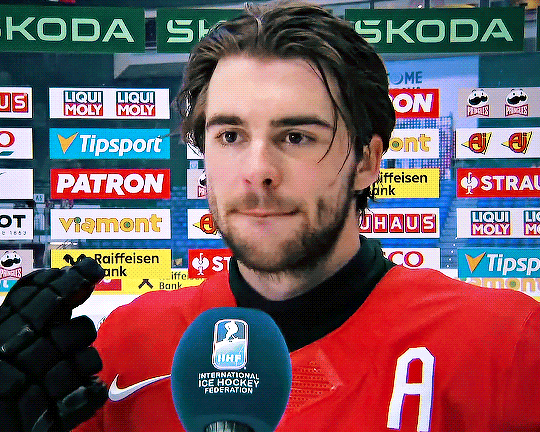
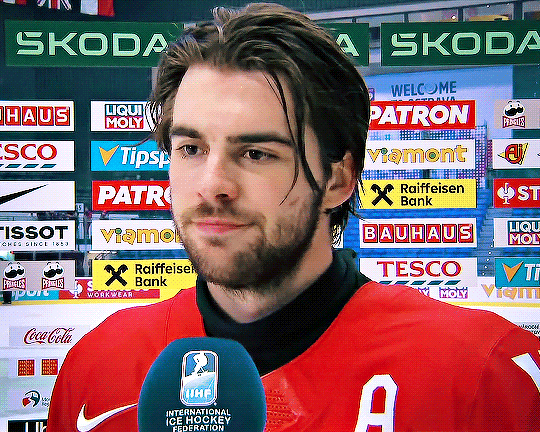
23 May '24 // SUI vs. GER
↳ 3-1 Win
"For the first time since 2018, you're going to the semifinals..."
#bb scored the game winning goal ❤️#nico hischier#team switzerland#iihf worlds 2024#my gifs#new jersey devils#nj devils#hockey
1K notes
·
View notes
Text
considering nate & maggie are said to have worked together sometimes, collaborating to discover art fraud pre-leverage… i’d like to imagine that maggie has at least heard of the leverage team members in passing. she wouldn’t recognise them in a crowd, but she’s familiar with big names in the art theft & forgery world. she’d have SOME expectations of what they were like. and then in the second david job, she’s meeting them and they’re. them. like-
what she knows about parker: worlds greatest thief, seems more interested in banks but certainly an art thief, too. nate says she has a reputation for being "insane".
what she assumes about parker: probably does some great grifting to get into those museums and vaults, been a world class thief for ages so she’d be in her late 30s at least by season 1. dangerous, formidable, scary, do not approach.
what she very quickly learns about parker: is a duckling who has imprinted on her
#leverageposting#leverage#parker leverage#maggie leverage#maggie collins#you know?#idk what she’d know/think about sophie. i’d like to hear that. what nate has & hasn’t mentioned abt soph.#word of god is that nate & eliot lowkey teamed up sometimes pre-leverage. idk if he’d say that to maggie but she might know that#eliot spencer is a rather infamous hitter & maybe that nate suspiciously doesn’t think he’s as evil as everyone says#alec hardison is a fairly new player in the art theft scene. previously was more just stealing money online or using peoples credit cards.#but more recently he’s apparently stolen the occasional art piece or artifact (jobs like the one he was trying to do in rashomon)#his jobs seem… kinda funny? not a danger like parker & eliot. she doesn’t get the computer stuff but it makes her a little paranoid to hear#what people can do online these days. it’s a weird world… wide web.
485 notes
·
View notes
Text

Shout out to all artists who had to work without any strong direction or instruction.
I wish you a merry “the client likes it anyways”
#non mdzs#The real mood of this comic is:#AKA: you are in charge of designing a character but have only been given personality as a reference.#This was technically for a game dev meeting and I am part of a team rather than a contractor hired on.#But hey the anxiety going into this was still crazy high. I was playing a risky gambit.#Part two of this comic is me putting all those clowns on a powerpoint and presenting them in front of a few people.#Pointing at them and saying “Okay which clown do you like best? How can we sex up this clown more?”#I think I may be giving the impression that I’m more into clowns than I actually am. It just fit with the character okay!#I had to consult the REAL down-for-clowners for tips. Photos exchanged in the dark alleys of a discord server.#A hooded figure shakes their head at the first photo. Slowly nods as I add puffy sleeves. Nods furiously as I drop the neckline.#This clown still needs to marinate a bit more before I’m ready to present them to the wider world.#So stay tuned! They have become a delight to draw and develop!#Game dev diary#As this is part of that new arc in my life.#Can you tell I've been practicing with digital art a lot more? Boy have I ever! I'm getting stronger! And faster!
554 notes
·
View notes
Text
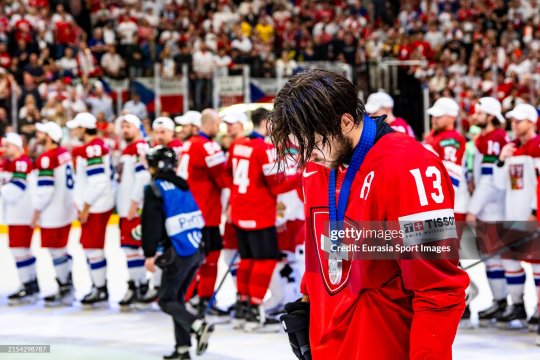
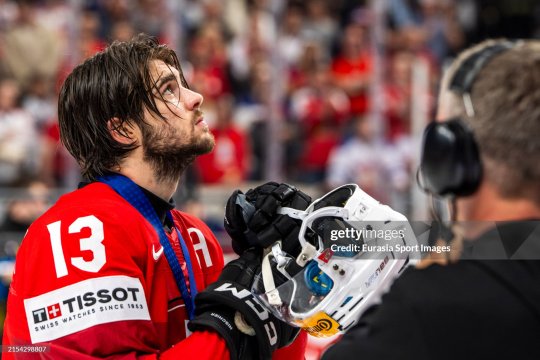
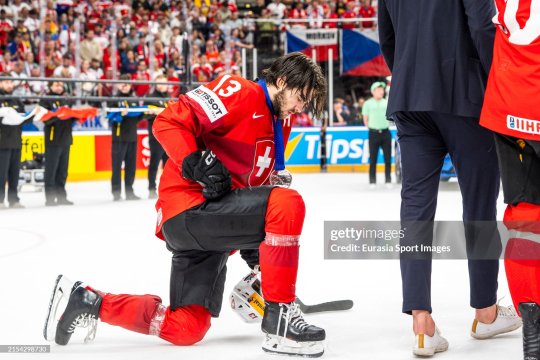
sad Nico photoset, sorry
#Nico Hischier#New Jersey Devils#Team Switzerland#Swiss National Team#IIHF Worlds 2024#IIHF Worlds#NJD#NJ Devils#the most beautiful face of despair#misery loves company innit#so gaze upon these with me
554 notes
·
View notes
Text
The Justice League had been a pain in Dannys side the last few weeks. They insisted that Danny needed a mentor, someone who could help him right in his ever growing list of abilities and whatnot. Danny snuck into one of the JL meetings in the watchtower to find out the real reason and discovered they saw him as a massive powerhouse that needed to be brought into thier side so his power "doesn't fall into the wrong hands". Ick.
Phantom was also pretty sure this had something to do with the bat be it contingency plans or adoption papers that guy is never too far from the top of Dannys list of "people I want to punt into the abyss for the weekend"
Its not that Danny doesn't want the help, he just knows how the League would eventually view him. He is of Lazarus. He is part monster. He has been ever since he died. Danny no longer thinks like a human does, he's "too violent" "obsessive" and "impulsive" by League standards.
Unfortunately, Danny is wired like that. His people are a part of the Infinite Realms immune system and play a key role in its overall ecosystem. There are legitimate biological reasons hes like this, ones that keep him from fading. The League doesn't seem to understand and he can't explain it in further detail without revealing his own weakness and the weaknesses of others like him.
So he just keeps refusing thier help...until he finds someone who the League also don't "agree" with which was strange since he was on thier team.
Plasticman was an ex criminal who has temptations towards money and has a hard time resisting. The stretchy guy also could turn his body into any shape and stretch any length he wanted and had no regard for the human form. Danny was in awe but the moment he heard the guy make a funny joke he made a decision.
If he had to choose a mentor from the JL roster than he picked this guy.
He announced his decision at the next JL meeting sending the place into an uproar.
Alternatively: Danny gives no warning and Plastic man just gets surprised when this glowy kid and his green puppy appear in front of him smiling happily and introduced himself as his new sidekick.
#fanfiction prompts#prompts#dp x dc#danny fenton#danny phantom#the justice league#young justice#teen titans#maybe#batman#plastic man#yall plas is so caught off guard#that face when the massive powerhouse your team is terrified of and has been trying to recruit onto the path or rightousness chooses#the ex criminal bad influence as his mentor#oh and hes prophesied to murder you and destroy the world#yikes yikes yikes#the most compatent person on your team is losing his mind in so many ways#plas is so happy and so is Phantom#danny is so glad he can just casually do freaky body horror stuff around his new mentor and it doesnt bother him at all
5K notes
·
View notes
Text


#next time ❤️🇨🇭#*my gifs#nico hischier#team switzerland#switzerland#hockey#new jersey devils#nj devils#iihf men's world championships#iihf men's worlds 2024#iihf world championship#iihf#iihf worlds 2024#swiss ice hockey#swiss ice hockey federation
359 notes
·
View notes
Text
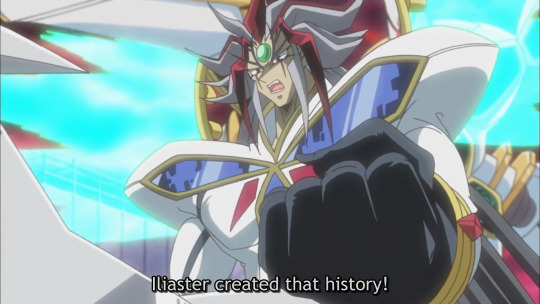
I watched this duel again yesterday and I honestly wish I had any sort of fresh take or unusual perspective on it, but I think the truth is that I just don't. This duel is three things for me:
Proof of concept for a very intriguing larger narrative (whose execution sadly doesn't land all the way for me)
The introduction of a character who has several interesting key aspects to them (and who could have, perhaps, been handled a bit better)
Emblematic of all the issues I have with the WRGP arc's writing.
As I said, I don't think I have any truly revolutionary things to say about this duel, but I feel like getting my thoughts out, so expect a fairly non-structured, stream-of-consciousness post below. There are multiple things here that bother me and I finally want to dissect them. Feel free to follow along if you also like examining stuff like this in more detail than it perhaps needs to be examined in. And I really mean examine them in unnecessary detail. Be warned, this post could count as a dissertation in terms of length. But I'm passionate and like analysing things, so no attempt to control its length was made.
So, I won't mince words here. The Team New World duel is absolutely where several major aspects of the time-travel-Iliaster plot completely fall apart for me. I want to make it clear that this isn't the fault of Aporia's character writing or what this duel is building up to, though. Nor do I think that the concept of a secret shadow organisation using time travel to influence world events is too out there. Lbr, this is yugioh. The time-travelling-cyborg-shadow-organisation is absolutely not the culprit of why I think some things don't work here. (And by here I mean specifically the WRGP arc.) Moreover, I'll be the first to admit that the finale this duel builds up to, with everything from the Ark Cradle beginning its descent to Yusei's final duel with Z-ONE, is stellar. So there are several things that do work here—but I think that may be exactly the reason why the other things piss me off all the more.
So what are the "other things", then?
Well, simply put, a lot of this arc's supposed setup and worldbuilding falls apart as soon as you start asking a few simple questions, first and foremost "why". And again, I will likely not be treading new ground here, but this just irks me to no end. However, so this post doesn't devolve entirely into unproductive whining about a part of the show I wish had been better than it was, I'll be doing another thing here: Trying to provide solutions for the things that irk me as I go along. As a kind of thought exercise, and because it's not hate motivating me here, merely extreme frustration about an arc that feels like it was fumbled like a hot potato. So, let's start digging through this mess.
The elephant in the room.
This whole arc (and in fact even the pre-WRGP arc before it) hinges on the concept of antagonists using monsters that can absorb synchro monsters, which is treated as such a monumental problem that we see Yusei, our protagonist, in downright anguish about it not one, but several times. Like, this eats at him.

(Pictured: A troubled boy brooding about his synchro summoning issues.)
And look, I know everyone and their mother has brought this up at this point, but this is already the first bit that falls apart under the weight of the question "why". Why is Yusei so hung up on the fact that duelling against Meklords means using synchro monsters becomes pretty risky? Why is this enough of a problem to supposedly drive the plot for a not insignificant stretch of episodes? Now, I know Yusei uses mainly synchro monsters as his heavy hitters, and I have seen someone bring up the fact before that even irl, completely altering the strategy of your entire deck is a pain in the ass, to say the least. And I do want to admit that this is a valid argument. If Yusei genuinely had to change his whole deck to accommodate the new circumstances, that would be a Herculean task, to say the least. However. While I can see the merit of that argument, I have to raise two counterpoints: One—who said he had to permanently change the entire structure of his deck? The show never gives us reason to believe that anyone other than the cyborgs will suddenly jump out of the woodwork and also use an anti-synchro strategy, and it doesn't show us anyone else who uses a strategy like that, either. And two—note the framing of this issue. The show never suggests that Yusei needs a new deck, or that all his old tricks are completely invalid now. It harps on and on about how he needs a new strategy, yes. But is that the same thing? In my opinion, nothing really demands that Yusei needs to restructure his deck completely. If anything, he only needs to keep in mind that this is now a possibility when duelling people, and thus start keeping a backup plan. And unfortunately, he kind of does, which is where I need to address the Dragon Knight Draco-Equiste-shaped elephant in the room, because it sadly undermines that sensible argument something fierce.

(Yeah, remember this thing? Because I do and sometimes wish I didn't just so I wouldn't have to get frustrated about it all over again.)
Listen. We're all not stupid. Even before the Team Unicorn match, the vast majority of people watching 5Ds would have been aware that tribute summoning, ritual summoning, and fusion summoning are very much methods to get around the dreaded synchro-killers that already exist in the card game and don't require any supernatural shenanigans to be acquired. But speaking only for myself for a moment, I was still at least a little bit willing to suspend my disbelief and accept that not being able to synchro summon would be a categorical impossibility for our beloved motorcycle family before this scene. Except, then Draco-Equiste comes out. And naturally, you're left to wonder "ah, so this is the solution to the synchro problem, then"? But no. No, it very much isn't. Because unfortunately, this is the one and only time Draco-Equiste even shows up. Immediately before and after this duel, this card is treated as though it never existed. Even though this thing could have posed a serious threat to the Meklords, what with being able to absorb the effect of a dragon synchro monster in the graveyard and being able to bounce back effect damage. (Can you imagine how differently the Team New World duel might have proceeded if Yusei had summoned this again?)
So, of course, we're left with the question: Why the fuck was this even here? And on the surface, the answer is super simple: To sell copies of Dragon Knight Draco-Equiste, naturally. But narratively? Narratively, this card's appearance is a disaster. It's a miscalculation of such insane proportions I can hardly find the words for it. Because it proves the assumption many viewers, especially TCG players, would have had from the start: Fusion, ritual, and tribute summoning are still a thing and would definitely work against Meklords. To say this takes the wind out of the sails of the central problem of "oh no, what are we going to do without synchro summoning" would be an understatement. And that's without addressing the fact that the actual "solution" the show provides against the Meklords, as cool as Shooting Star Dragon and Red Nova Dragon are, is, on paper, ludicrous: In a bind because your synchro monster gets absorbed? Just synchro summon harder! And I just. Please. We can agree that this is silly, right? Even if they're very cool dragons and I definitely appreciate them, this is almost looney tunes logic.
Swinging around to a more productive discussion, could they have done their "uh oh, synchro summoning is now impossible"-bit in a better, more coherent and less silly way? Probably, but depending on how they might have handled it, they would have probably needed to sacrifice some other things. The issue here is the thematic element. Synchro summoning is hated, and thus punished, by the emperors of Iliaster because to them, it's a symbol of humanity's greed and subsequent destruction. And originally, the show ends up vindicating its use despite their warnings about the destroyed future in a sort of awkward "with great power comes great responsibility"-way. As in, synchro summoning still has the potential to ruin humanity by the end of the show, but Yusei and the others "earn" their right to use it anyway because they and humanity as a whole learn the lesson not to overdo it. Supposedly. The metaphor is, frankly, a bit wonky, which might be another problem in and of itself. But what's relevant here is that any attempt to fix this conundrum would thus have to keep the thematic element intact. To do that, our protagonists would therefore have to rely on synchro summoning at the start of the arc, as they did before, and would also have to rely on it by the end of the arc (again). The in between is, I think, where more interesting things could have been done with the concept, though—moreover, it's where I think the plothole of "hey why doesn't anyone tribute/fusion/ritual summon" could have been addressed. Say the gang learns that synchro summoning might now get dangerous and actually tries to shift gears. Say they do try out fusion, ritual, and tribute monsters to account for that—only to run into an in-universe meta wall and realise that sure, these monsters might not get absorbed by Meklords, but their effects and strength can't keep up with the synchros their opponents use, or that they're flat out too cumbersome to summon! It could have been as simple as showing scenes where trying to get tribute fodder onto the field or play a fusion or ritual spell card would have been too slow, too inefficient in a duel. They could have also gone an even simpler route and flat out made it so that Meklords could have absorbed any extra deck monster. Would this have made them stupidly overpowered? Sure. But wasn't that kind of the point, anyway? The Meklords were supposed to be a nigh insurmountable obstacle that ultimately required discovering not one, but two new, unique ways to synchro summon—and even then, the solutions still weren't perfect because Shooting Star and Red Nova can still get absorbed under especially tricky circumstances. So I doubt making them that much more powerful would have mattered. (And they had to be heavily adjusted for the irl TCG as is, so there's not really a need to factor in that concern, either.) Finally, and I admit this pains me a little to say, I think that any version of the synchro dilemma that wanted to make sense should have flat out removed Draco-Equiste. The card does nothing except open plotholes, and especially if we want to keep the themes intact without opening the can of worms that is alternative forms of summoning possibly being a better solution than Accel Synchro or Burning Soul, its presence just becomes a hindrance. Sorry, Dragon Knight Draco-Equiste.
So much for the synchro dilemma, then. But unfortunately, this is not the last aspect of the worldbuilding surrounding the three emperors of Iliaster and especially their Meklords that's built on a shaky foundation, to say the least. Onto the next one.
2. The Meklord genocide and the many questions it asks (and never answers).
I'm gonna roll several points into one here because they're all related to the Meklord genocide—that being the supposedly unavoidable catastrophe in the future where Aporia received all his trauma from. And I want to preface this with two statements, one good and one bad. Firstly, Aporia and the way his backstory gets exposed, quickly getting us intimately acquainted with the utter devastation of the Meklord genocide, is extremely compelling. You really get a sense of the terror at play and it gives him a perfect, understandable motivation for wanting to avert that future at all costs, even if human lives have to be sacrificed along the way.
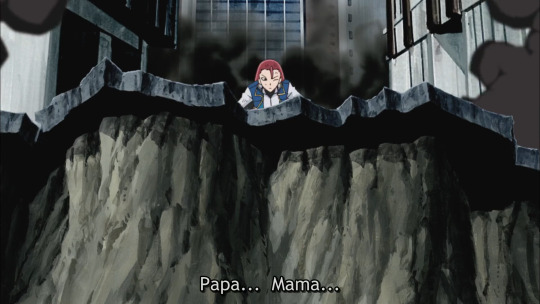
(Ahhh, the lovely smell of childhood trauma in the making.)
Secondly... The Meklord genocide makes zero sense, and it has everything to do with the fact that once again, several major aspects of it buckle under the weight of a few simple questions. But let me roll that back first and examine what those major aspects, which the Team New World duel introduces us to, are.
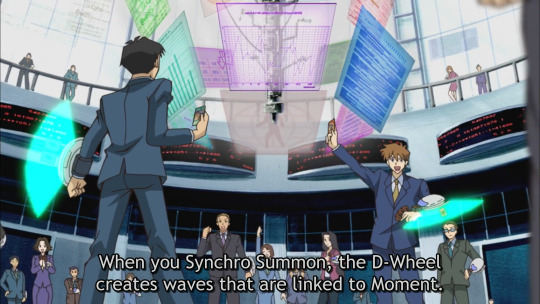
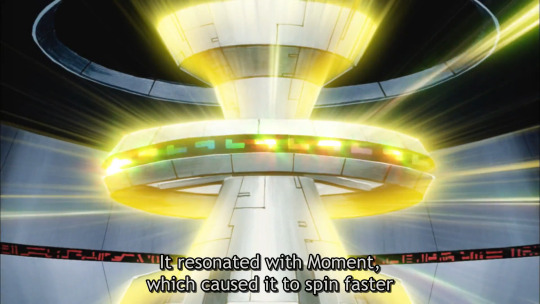

Number one: I went back and checked, and this is the first time in the series that we are introduced to the concept of synchro summoning resonating with Moment reactors. Previously, the reactor itself, through the concept of planetary particles, and, by extension, the Moment energy itself was only implied to be something like a perpetuum mobile, infinitely producing its own energy.
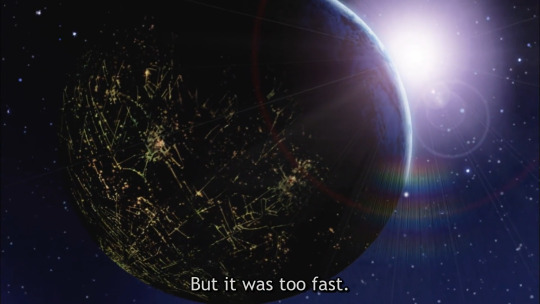


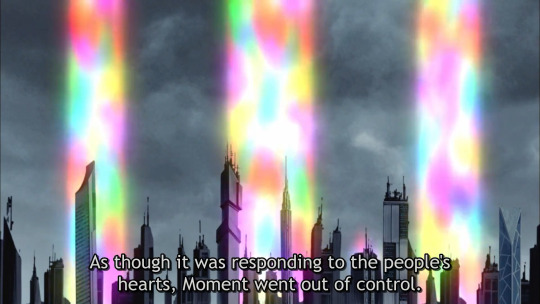

Number two: Now, we have heard of Moment rotating backwards and exploding in the show before. But there are two new things here, one being that the Iliaster trio explains that in this instance, it caused a chain reaction, and that, for some reason, all the Moment reactors began exploding one after the other. The other, more crucial part being that they claim the Moment reactors responded to people's hearts. This ties in with another small thing introduced much earlier, where Bruno/Antinomy explains that Clear Mind, Yusei's accel synchro technique, is a way of "controlling Moment". Both link the reactor and its energy, which are pillars of 5Ds' worldbuilding, to human emotions. And I already need to say this here: This doesn't make lick of sense. But more on that later.
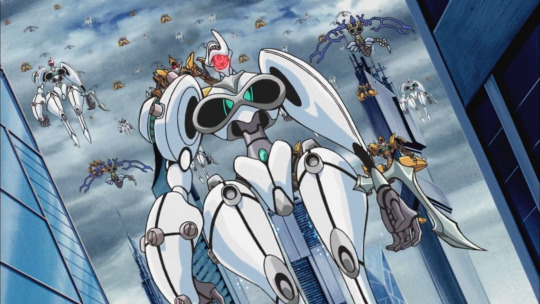
Number three: We don't get an outright explanation for this in this duel, as in, it's not stated verbally, but right after Moment supposedly "responds to people's hearts", the Meklords show up, heavily implying that the reactor, for some reason, summoned a robot army to destroy humanity.
Now, I'm going to give you the quick-fire round of questions these three concepts immediately sparked in my mind when I saw these scenes, because I think that will illustrate just fine why I have such a problem with all this: Since when is synchro summoning linked to Moment and how? If humanity already knew through the Zero Reverse incident, which is the foundation for 5Ds' canon, that Moment reactors could spin too fast, gain a negative rotation, and subsequently explode, why on earth did nobody think to install safeguards against that? Why are the Moment reactor and its energy linked to people's hearts now? How does that even work? And how is a human supposed to "control" a sodding energy reactor that was implied to stay in perpetual motion through a set of gears, which famously know how to read hearts, through achieving a clear mind? And why, oh why did the reactor—independently of its human creators, apparently—have a killer robot army at its disposal to let loose on humanity when it grew sick of their shit?
This plot has so many holes, it may as well be a net instead. And you know what the worst part is? The show answers none of the questions above. Moreover, the implications behind the concepts introduced for the sake of setting up the Meklord genocide are buckwild, to say the least. Let me run with this real quick to highlight the absurdity here.
Taking the idea that an energy reactor can respond to people's hearts and summon an on-demand murder robot army of apocalyptic proportions when humans around it grow too evil at face value honestly makes me wonder how the Moment reactor in NDC hasn't exploded five times over since its creation. You mean to tell me that between Goodwin's Iliaster goons, the Arcadia Movement, the corrupt security forces, and all the duel gangs in Satellite, there weren't enough evil people there to make the reactor go crazy? Plus, all of these people were already synchro summoning as if their life depended on it! Synchro summoning is basically ubiquitous from the moment the show starts, to the point where it's more unusual to see a duellist who doesn't synchro summon than one who does. But somehow, that wasn't enough to affect the reactor yet? Or is the implication here supposed to be that the part where the man-made machine meant to produce limitless energy can suddenly see into people's hearts was added later into the reactor's development? That humans for some reason decided, "yeah, that's what our new energy source needs! A way to shame and punish us with violence on an unimaginable scale for our transgressions!" And that's without addressing the robot army. Who built these things? And who decided it was a good idea to put them at the disposal of the very reactor itself? Do you mean to tell me some team of utterly cracked up scientists decided that the best entity to put in charge of the robot army that was constructed for some reason was the reactor system supplying the world with energy, "computers can't be blinded by human error and would thus never deploy this army for selfish reasons"-style? (Honestly, I almost wish that had been the idea here, but I'm absolutely certain it wasn't.)
I can already hear two major criticisms to the above, purposefuly hyperbolic extrapolation in the back of my head here. Allow me to talk about them for a moment.
One—"Okay, so the WRGP arc has plotholes. Didn't the dark signers arc have those too, though? It's not like they explained everything about all that stuff."
You're right! It did! As much as I love the dark signers arc, it hardly has the most tightly-written worldbuilding of all time, either. There are lots of things, some small (why was Rudger/Roman somehow a signer and a dark signer at the same time), some not so small (why on earth did Rex' plan to summon the king of the underworld and remake the world seemingly hinge on one of the signers failing to seal their tower, which he could have never guaranteed in a million years) that the DS arc never properly takes the time to explain. But even so, the dark signers arc doesn't fall apart under questions such as "why" and "how" nearly as easily as the WRGP arc for a reason that is as simple as it is stupid: The DS arc has a much less ambitious premise, and though its antagonists are cool, they don't actually pose a greater, moral dilemma. Think about it. The premise of the DS arc is a run-of-the-mill prophecy thing. You've got your chosen heroes, your destined enemies, and a battle for the world using supernatural shenanigans. And a lot of questions of "why" or "how" are relatively quick to be brushed aside with "magic" (or rather, Crimson Dragon/Earthbound Immortal shenanigans). Moreover, the dark signers themselves, while having interesting stories relating to the heroes on a personal level, are still, fundamentally, pure evil. They're not fighting to prevent a devastating, apocalyptic future, they just deadass want to get revenge and destroy the world. And all the more complicated, major themes the arc has (class discrimination, police brutality, how societal alienation can lead teenagers to join cults, poverty, etc.) are actually not really tied in with the Earthbound Immortals, instead happening on the sidelines or only being tangentially related to the dark signers (such as when Kiryu becomes a dark signer through the abuse suffered in prison). The only major theme that ties in with the dark signers is destiny VS. freedom of choice, which also gets resolved in the battle with Rex Goodwin. (Interestingly enough, all the more complicated themes on the side were also dropped after this arc, but that's a rant for another time...) Perhaps the arc still has some inconsistencies here and there, but largely, it stays fully coherent. Thus, the DS arc makes it way easier to suspend one's disbelief, making the unexplained parts seem much less egregious.
Two—"Calm down, this show was made for twelve year-old Japanese boys. They don't need to explain any of this."
If you honestly think children don't deserve well-made entertainment whose concepts and worldbuilding can hold up to scrutiny, I have nothing to discuss with you. Sure, children will swallow some concepts much easier and will suspend their disbelief much longer and more artfully than any adult on average, but that doesn't mean "kids are dumb anyway so why bother putting as much effort into worldbuilding for their shows as for adult shows" is the hot take you think it is. I am fully congnisant of the target audience for this show—that doesn't make me any less convinced that said target audience deserved a show where things made sense while they were watching it and where things could still make sense if they decided to rewatch it years later. Because, you know, that's what I think a good show should be able to do.
And with that, I can come back to the WRGP arc and an issue that ties in with both things I just addressed: The WRGP arc's actual story premise, buried beneath the well-known, equally beloved and beloathed tournament arc format, is a lot more ambitious than the DS arc and has several, fairly heavy, core themes that it sets up and tries to resolve by the end, among them: learning how to cooperate as a team (during the WRGP) and learning how to be independent (by the end of the show), destiny VS. forging your own path (round two), and, most importantly, taking responsibility and fighting for one's future. That last one especially is not only a good topic to address in a show specifically made for 5Ds' target audience, it is also represented by both Team 5Ds and Team New World in-story. Spicier yet, both teams are actually fighting for the same thing. Team New World, having seen the supposedly unavoidable, tragic future and thus decided to take action against it, is fighting for a future that doesn't have to be marred by such tragedy, by whatever means necessary. And Team 5Ds, young, hopeful, and trusting in their connection to one another and humanity as a whole, is fighting for a better future because they believe that tragedy can be avoided. The future these two teams want is almost the same—the only, crucial difference is that Team New World has embraced the use of drastic measures to bring that future about, while Team 5Ds hasn't. To Team New World, the future presents something like a trolley problem, if you will: They think doing nothing will lead to that inevitable tragedy and erase humanity, whereas sacrificing New Domino City in the present will still kill people, but preserve humanity in the long run. And they have firmly decided pull the lever and set the course so the trolley runs over just one person instead of many. Team 5Ds, meanwhile, isn't even thinking about the lever, instead insisting there has to be another way, and that even thinking about getting anyone killed for this is stupid. The whole conflict is, on paper, wonderfully compelling, because you can see where both sides are coming from. Sure, Team New World's members still act like absolute dickheads in true yugioh-tournament-opponent fashion, but ultimately, their goals make sense. Viewers can put themselves in their shoes and perhaps think that, faced with a horrible dilemma like theirs, they would make the same, awful choice to set the course and cause suffering now to avoid greater suffering later. For the greater good.
Unfortunately, the questions I listed above undermine all this somewhat, because as good as these antagonists are on a character level, it's incredibly easy to poke holes into their backstory and especially the circumstances surrounding the horrible, distant future they want to avoid so desperately—which, in turn, undermines that terrible future somewhat, because this is a narrative that demands weight (in my opinion). But if the supposed threat at the end, the terrible thing even our protagonists briefly aren't sure they'll be able to avoid, begins falling apart at the seams in terms of logic when you think about it for more than two minutes, where is that weight supposed to come from? There is also another question to be answered here that I need to discuss so I can touch on a central aspect that hampers the plot in this arc somewhat later:
Why are they so convinced that horrible, destroyed future is utterly unavoidable?
I want you to really think about this question, with me. Canon... never really gives us any direct proof that they're justified in being this certain. However, that doesn't mean we don't get an answer, per se, though the answer is a bit vague.

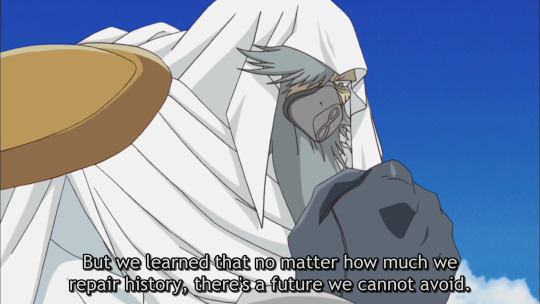
The implications here are... something, to say the least. First, as our basis, we have to assume that every "correction" Iliaster has made has been to avoid humanity's destruction in the future. Because frankly, that's all we get as far as Jose, Placido, and Luciano's definition of the "correct path" goes. Then there's the second bit. Apparently, they've been merrily "repairing" history for a good while already, yet, for some reason, they always get the same outcome: The Meklord genocide. This, in turn, has led them to take more and more drsatic measures to try and avoid it. And I want to point out the very obvious, mind-boggling implication that comes with this: Apparently, after every "correction" they made, these three have either let history run its course to see where it ends up this time, or have quickly zipped over to their own time to check whether things were still shit. Meaning Iliaster's whole deal of fixing history to make sure the Meklord genocide never occurs has been a very, very long run of trial and error. (I want you to think of all the possible "fixes" this could have included for a moment. We know from BBT that killing Pegasus was one of the ideas they had, for example. Did they also try to kill the presumed Industrial Illusions employee who came up with synchro monsters? Did they try to kill Yusei's dad so Moment would never be invented? Could they not have tried to simply inhibit the creation of the robot army, then? Or made sure someone installed some bloody safeguards on the reactors, as Yusei later does in-canon, which somehow works when he does it? The list goes on.) Now, we know that in canon, their newest idea is that the future can be fixed if they just destroy New Domino City altogether.
Here, the questions begin again (you may sense a running theme): If Moment is already invented and internationally known, why would destroying its place of invention do anything? If synchro summons are already a thing, doesn't that mean destroying NDC would only slow the catastrophe down, at best? And most importantly: Why are these guys so utterly convinced that this "repair", of all the ones they've already done, will save their future? How can they know that this particular plan will work when they've supposedly already tried everything?
(There is, of course, the tragic possibility to consider that perhaps, they know that there's no guarantee this will work. They've tried everything, after all. So maybe they know this won't fix things, either. But we know that Aporia, like Paradox, like Antinomy, and like Z-ONE is, somewhere at the bottom of his despairing heart, still desperate for a shimmer of hope. And maybe, just maybe, he has reached such a point of desperation that he'll watch an entire city getting destroyed if it has even the faintest chance of succeeding. But unfortunately, this is purely speculative—the show never states this, and so, I can only leave it in the realm of fan interpretation.)
The show never answers this question, either, instead relying on the audience to suspend their disbelief some more and assume that Iliaster has put in the work and is 100% certain that the future can and will absolutely end in disaster unless they destroy NDC now. It almost acts like they have some sort of supernatural foresight; they know things nobody else in the show's world does, and due to this (and their non-human status) they label themselves as superior to the "foolish humans", who, without their guiding hands, will only bring about the apocalypse. But their superiority and the internal consistency of their actions is already wobbling under the weight of all the half-assed worldbuilding I mentioned above, which is an extra big problem due to another, major difference between the WRGP and the DS arc: While the DS arc stylised itself as a sort of funky genre mix between cyberpunk dystopia and urban fantasy (in a very broad sense, given that ancient Inca gods are very much real and their prophecies come to fruition in the modern day, yet we are not presented with any sort of magic outside of the conflict with the dark signers), the WRGP arc, aside from its tournament format, stylises itself much more as science fiction. The antagonists are no longer ancient, evil shadow gods, they're cyborgs from a destroyed future. Their motivation isn't as simple as wanting to destroy the world, either! In fact, they want to save the future! And they don't pose a threat to our antagonists through shadow duels in rings of fire and giant, magical monsters that sacrifice human souls to be summoned. No, they have advanced technology like high-tech robots that cut our protagonists off from one of their go-to tactical options, and they send out duel robot armies, and they travel through time by means of sophisticated wormhole-technology.
...But do they?
Now, I said I don't just want to complain here, I also want to provide solutions—and I intend to stick to that. But first, because these two things are so intrinsically tied together, let me address the final aspect that puts Team New World as antagonists and the WRGP arc on such shaky ground from a writing perspective.
3. Wibbly-wobbly, timey-wimey, magic-science cyborg nonsense.
So, I've talked about the strongly differing methods the Iliaster trio uses in comparison to the dark signers. Sci-fi is the name of the game now, so we've got robots, cyborgs, advanced tech and... time travel. But amidst all this, you may have noticed something. Even though our plot is supposedly decided by futuristic tech now, the magical/occult element that was there in the first half of the show doesn't actually get dropped. Why? Because it can't be. Because the signers, our protagonists, are defined by their status as a group of magical chosen ones, hand-picked by an ancient Incan deity. Regardless of what the writers of the show wanted here (and my personal guess, based on hearsay and what I've read on forums, is that they wanted to hardcore-pivot to sci-fi because they hoped it would engage audiences more), this was an element they couldn't erase. (Or, well, technically, they could. The signers do lose their marks at the end of the show, after all. But perhaps they thought doing that earlier was too risky.) So genre-wise, we've got a bit of a situation here. From the pre-WRGP arc on, 5Ds is more of a sci-fi show, yet, we've still got all this occult stuff wandering around that can't be cut out of the narrative and still influences it because it's too intrinsically tied to our main actors not to. And you might have noticed that this actually doesn't just extend to the signers. As in, they're not the only ones where sci-fi and magic elements mix. This happens for the Iliaster trio, too. Placido gets a sword that can randomly cut a hole in space-time (and it's never explained how). The Meklords can cause real damage in duels even though they're supposedly not supernatural. Moment reactors can suddenly read people's hearts. Not one, but multiple cyborgs get a magical girl transformation where they change clothes and runners, or even combine from three people into one. And for some reason, the Crimson Dragon, even though its "own", central enemies, the dark signers, are already defeated, doesn't take its marks away from our heroes until after the cyborgs are taken care of, suggesting that the ancient, magical entity recognises the robots from the future as a supernatural threat of some sort. None of this is presented with any sort of attempt to get it to make sense, yet, we're supposed to believe it isn't magic, because we're all about robots and time travel now.

(Insert the magical girl transformation song of your choice.)
And I want to make one thing clear: I'm not saying this weird genre-mix couldn't have worked. In fact, I think it's hilarious and low-key brilliant even in the wonky state we got. Sure, let's make the antagonists robots from the future while keeping our protagonists the agents of an ancient Incan god on the mortal plane! If nothing else, you absolutely can't argue the idea wasn't original.
However, even with all the love I have for the show, I can't help but feel like there's an issue here, and the only way I could put it into words would be genre dissonance. We are supposedly in a sci-fi show now, yet the central antagonists, who are also the fundamental reason for this genre shift, seemingly can't decide whether they're actually using technology or magic for their schemes. And this becomes a problem insofar as that seemingly no effort to meaningfully fuse the fantastical elements with the pseudo-scientific ones is made, yet at the same time, they aren't properly separated, either. Specifically the latter might be harming the show even more than the former. Let me explain what I mean.
I'm no stranger to the fact that sci-fi sometimes likes to use technology that's supposed to be so advanced that to an outsider, it begins looking indistinguishable from magic. And in all fairness, that is probably what the 5Ds writers were gunning for. What hampers this a little, though, is that we're just coming from an arc that had actual magic in it, which leads to the allegedly scientific elements sending some mixed messages. Especially because they're never explained. And I'm not saying we needed super hardcore, internally fully consistent sci-fi worldbuilding here. Frankly, with all the weird nonsense 5Ds has already mostly handwaved by the start of the pre-WRGP arc, that would have been absurd. But I think a few explanations here and there, hell, even just the occasional off-handed remark, could have done a world of good for this arc, and especially for the Meklord dilemma and the setup of the ruined future. I don't need a whole breakdown on how exactly a reactor knows about the greed in people's hearts, but a remark somewhere on the side about how, for example, the particles that are the central player in that reactor also happen to be copious within the human heart (which would be impossible to prove, but ignore that) would have been nice. And I don't need a full breakdown of how the robot army was built; a throwaway remark that humanity created it as weapons in their supposedly endless, petty wars could have been cool, though.
My point is, fundamentally, that unlike the occult nonsense, which can skirt by on prophecies and simple, black-and-white, good VS evil stuff, the sci-fi elements feel like they demand a surface-level justification for their existence, at least. A surface-level justification they didn't get. And this is without addressing the much, much bigger problem that may actually be the root cause of most, if not all the things I've listed above so far: The time travel.
I don't think it's any sort of new, groundbreaking opinion to say that time travel is a notoriously finicky worldbuilding element that many writers, regardless of medium and/or skill, have already massively shot themselves in the foot with. And unfortunately, I feel like this has happened in 5Ds, too. Specifically because the time travel has seemingly absolutely no limits. The Iliaster trio (and even Paradox) can seemingly be everywhere they want, in any time period, and do whatever they want/deem necessary. Worse yet, the time travel is actively shown to have massive consequences more than once. And I think it's under the weight of this massive, utterly uncontrollable element that the plot really begins to collapse. Because frankly, with the implications we're given, things just really don't look good in a universe where limitless time travel can be used! Let me circle back to two questions from above to really emphasise this: Why are these guys so utterly convinced that this "repair", of all the ones they've already done, will save their future? How can they know that this particular plan will work when they've supposedly already tried everything? In a universe with limitless time travel, these questions become an absolute mess to deal with. And the real problem is that canon never even entertains the idea of answering them. Sure, you can begin to fill in the gaps for yourself if you feel like it. Maybe it's not that all the previous "repairs" Iliaster did truly didn't work, maybe they brought about even worse futures and that was the reason why they were discarded. Or maybe there's a hidden in-universe rule that people from the future who go back to the past actually don't have the power to change anything, as in, no matter what they change, it will never affect their present, because their actions will always loop back around to causing the same things they already know. But there. Precisely there is the problem. I'm not getting this from canon, I'm making it up from scratch. And sure, all stories have gaps—that's where a lot of fanfiction lives, after all. But when you reach the point where you have so many gaps that the audience can no longer suspend its disbelief over these gaps, that's when there's a problem. And the WRGP arc, for all that its antagonists are extremely compelling, pose genuine, moral dilemmas, and for all that it resolves in one of the best arcs of 5Ds, has precisely this problem for me. The worldbuilding is stretched too thin, and my suspension of disbelief breaks and leaves me wondering why so many good themes have to be buried in an arc that is this frustrating to watch sometimes.
*deep breath*
Okay. So now I've aired all my grievances and laid out all the problems that make me shake my fists in frustration at this arc, at the Meklords, and at the Team New World duel. What about the productive part, then, you might ask. I did say I wanted to provide solutions, as far as I can, anyway. How would I try to solve this mess?
Well, honestly, I think the solution here, at least to me, would be fairly basic: More consistency. Make it make sense. The genre mashup can stay exactly the way it is, but maybe tone down the magic on the cyborgs a bit. Make them actual cyborgs. Even if their tech is justified through bullshit, at least justify it. Why does Placido have a reality-splitting sword? Oh, it's actually the Moment Express wormhole technology in miniature. Why can Moment reactors see into people's hearts? Well, duh, they contain the same, special particles as human hearts. Why is there an army of robots in the future to begin with? Humans built it. For war. Like they did so much else. And why did the reactor use it against them? Because it was just responding to their own negativity. Their own, constant desire for strife and petty conflicts amongst one another made them actually turn the weapons against themselves (or rather, against the people they personally didn't like, which ends up being everyone when everyone has a grudge against someone) through the reactor. (The show almost does this one, but not quite.) How do the three emperors of Iliaster know destroying NDC, specifically, will fix the future? They don't! They're doing this on trial and error, and more importantly—and I think this would work best if it was introduced purposefully late—they can't actually save the future by changing the past, because they're not from the past. They just don't actually know that this is a rule of time travel.
None of these fixes would have to be big, episode-spanning things. Off-handed remarks would have been enough. But I think just that could have saved many points from becoming the plotholes they did.
And with that, I think I'll finally leave you be, I've rambled quite enough. To anyone who has made it all the way to the end, I can only give a sincere, heartfelt thank you. I realise this is a LOT of words. Moreover, I'd like to leave you with one more statement: Though I can absolutely understand if this post comes off as me getting on a soapbox and cupping my hands around my mouth before yelling, it's not meant to be. I absolutely invite discussion about the the handling of, the themes behind, and all the arguments I gave regarding the Meklord worldbuilding and the Team New World duel. So, feel every bit as free as I did to yell about this. This post encourages yelling.
#yugioh 5ds#ygo 5ds#5ds#yugioh meta#Team New World#Aporia (5Ds)#meklords#orchid rambles#I just realised this post reads like a whole-ass youtube video essay#shows what I've been watching recently#anyway this isn't getting any more coherent than this#I have too many thoughts to be able to stay coherent at this point#so just take it
47 notes
·
View notes
Text
"You must be Ra's," Tucker stated, careful to keep on a poker face while he frantically assessed the situation - tied down to a chair, in what was probably the heart of this particular fruitloop's lair.
And there was a frankly disturbing number of similarities to the OG fruitloop: the way he stood, the style of his hair, the perpetual sneer.
The way he sent a shiver down Tucker's spine like Vlad used to be able to way back when he was still intimidating.
"Gotta say," Tucker continued, shoving his emotions down like only a human-born liminal that dealt with empathic rogues on the daily could ever manage, "not that impressed. For starters, your vibes are rancid, dude. Like, what do you do, bathe in corruption all day?"
That earned him a slap on the face, "You will speak when spoken to," Ra's ordered.
Tucker witheld a smirk. This guy seemed like the type to order subordinates around to do absolutely everything. The fact that he personally slapped Tucker with his own hand? It could only mean that Tucker was already under the guy's skin.
"Well, that just means I can keep talking since you just spoke to me," Tucker retorted, unafraid of another slap. Really, compared to the abuse he put himself through helping Danny, and the way his liminality skyrocketed in the last couple of years, it was barely even a love-tap. It didn't even sting.
Ra's raised a brow, giving the distinct impression that he was absolutely livid, though that may have been the liminal empathy cluing Tucker in. He'd never been great at reading emotions until that particular ability developed.
"Who do you work for?" Ra's began the interrogation.
Tucker returned with his best affronted glare, "Frankly, I'm offended that you don't believe I could do all this entirely on my own."
"Kill him," Ra's stated as he turned to leave, sounding so unimpressed that it almost seemed bored.
Out of the shadows, an arrow flew straight at Tucker, who slipped his restraints (thank you liminality for giving him limited ghost powers) and caught the arrow before it pierced his chest, "Yeah, no. Imma veto that."
Ra's turned back around, looking almost impressed.
It made Tucker feel way slimier than Vlad could ever hope to achieve. He repressed a shudder. After all, his job here was to keep Ra's distracted while the others invisibly raided the place, destroyed the pits, and planted explosives.
Tucker, being the technopath, would normally stay behind in the chair, but the League of Assassins was well defended against cyber attacks, forcing them to pivot somewhat in order to successfully infiltrate the place. He ended up creating a digital duplicate of himself (a literal duplicate, like Danny could do, but Tucker's duplicate could only ever exist inside of a computer, by all appearances a true AI) that the others could upload to the servers once they found them.
Beyond that, there wasn't much Tucker could do beyond providing a distraction. Sure, the LoA's technology was absolutely worth drooling over, but they didn't rely on it like most of the modern world did. There was no internet connection, electronic locks, or surveillance for Tucker to hack into and make his own. This place was all stone doors and medieval fortifications.
"Impressive," Ra's complimented after a moment of silent appraisal, "perhaps you are worthy of my attention after all."
Tucker scoffed, getting the clear impression that this guy fully expected the ground he walked on to be worshipped after admitting such small praise, "You're not the first megalomaniac I've had to deal with, and you won't be the last." (Team Phantom had an entire list of fruitloops to work through once their LoA financial backing was removed, after all) "I'll give you props for the sweet ninja cult you got going on, though. Gotta say, that's a first for me."
"Assassins," Ra's corrected.
"Same diff," Tucker retorted with a handwave, knowing full well that a guy like Ra's would be miffed by such a dismissal. He further feigned disinterest by examining the arrow he was still holding. Tucker had taken a few archery lessons when he was younger and picked it back up by training a bit under Princess Dora's royal guard. He was... decent, with a bow. He could reliably hit his target as long as he had a couple of seconds to aim - or used something laced in technology that allowed his technopathy to steady it.
The arrow was expertly crafted and perfectly balanced. His heightened liminal senses smelled a substance on the arrowhead - probably a paralytic, not that it would have kept Tucker down for very long, even if it had breached his heart, which would have been a quick death for any baseline human. He tossed it from hand to hand a few times, feeling the weight, the threw it like a dart into one of the nearest shadows. A soft thud echoed through the room when the arrowhead bonked the chestplate of the assassin standing there, then a clatter when it fell to the ground.
"If I had a bow, he'd be dead," Tucker needlessly commented, thumb pointing to the hidden guard. He was somewhat surprised the dude didn't catch the arrow like Tucker had. But then again, if the shadows were meant to fully conceal him, catching the arrow would have given him away from the arrow not making noise or falling to the ground.
"You knew he was there," Ra's stated more than asked.
"And the eleven others," Tucker easily replied, "A full dozen to guard the King of the Cult. Not that it'll make any difference. I've already won."
Tucker didn't have any misconcieved notion that his liminality would give him an edge over a dozen trained assassins. It doesn't really matter how good your senses are or how fast your reflexes when you have to dodge a dozen attacks simultaneously. But what he could do was turn intangible during those first few seconds of adrenaline-fueled panic, more than long enough for either of the Phantoms, neither of which were currently more than a few hundred yards distant, to reach him and drag him away from immediate danger.
So Tucker latched onto that confidence borne of complete trust in his team, and radiated it as much as he could, daring Ra's to call his bluff with nothing more than a knowing smirk.
#in which team phantom solved all their problems in amity park#saw the justice league barely keeping up with the corruption throughout the rest of the world#and decided that clearly they need some help so team phantom is gonna solve their problems for them#bit of research and handling some medium level villians and their starting to see repeated connections to the LoA#clearly this LoA has fingers in all the pies so taking them down would harm a lot of other villians' plans#and raiding their base will hopefully give them a clear list of new targets#im imagining that team phantom is not above killing but will avoid it if any other solution is viable#ra's is definitely going on the kill list#probably ghost king phantom#definitely hyper competent team phantom#probably late teens early twenties#the justice league sees a wave of destruction toppling all their rogues and have no idea what is going on#team phantom is basically a force of nature coming down on all the dc villians like an anvil#dpxdc#dp x dc
226 notes
·
View notes
Text

beach ep 🏝 (happy 14th anniversary to tog!!!)
#the outfits are from tognw#me vs making s&s art for every celebratory fandom event#tower of god#tower of god new world#tower of god season 2#team sweet and sour#team sweet & sour#kuuart
228 notes
·
View notes
Text
Dear supporters
My name is Tariq Dahlan, a 28-year-old Palestinian journalist who has witnessed the harrowing reality of Gaza through six wars spanning from 2008 to the ongoing genocidal massacre of 2023. Additionally, I lived through the tumultuous Al-Aqsa Intifada from 2000 to 2005.

Throughout this ongoing genocide in Gaza, journalists like myself have faced severe threats. Tragically, many of my colleagues have lost their lives simply for seeking to shed light on the atrocities of the occupation. Their sacrifices, and those of their families, epitomize the highest price one can pay for freedom of expression.

My mental health is bad, and I doubt I will ever fully recover from the horrors I have witnessed. My family, too, bears the weight of psychological trauma, exacerbated by our displacement in search of safety amidst the destruction wrought by the occupation. Compounding our challenges, my mother suffers from kidney disease, requiring specialized care that is scarce in Gaza's depleted healthcare system.
Now, I reaching out to you, seeking your support to rebuild our lives and secure the basic rights of my family. We have committed no crime other than being Palestinian. I implore you to help us find hope for a future free from disease, hunger, and the incessant threat of violence

My mom, dad, brother and more brothers
@disabledalliums @craftykittyscientist @wreaking1wreathe @letters-to-rosie @avi-wings @thomas--bombadil @plotterprints @palestinesfinest@mar64ds @scarlet-traveler @thefakehedgehogaroundhere @soviet-space-ace @steampunk-ghostxx @biggestgirlfailure @hash-slinging-slasher-trash @raya-1010 @breadscugs @reggie-the-inferi @clueless-inc @heritageposts @c-u-c-koo-4-40k @yourgaygrandpa @badulgummsblog @thatgeekynerd214 @herbgroom @kasprsketch @parab0mb @pyjamaenzel @cartoon-enjoyer @cuddlingdragons @stormsknife @paimonpudding @cool--chicken @roasted-melon-guy @vorgino @sayruq @cosmicgamerboy @bloodmoonlich @anassemblageofpassions @addisayshi @apocalyptic-dancehall @heelydoc-martens @mahougirlys @happierdrunk @lobotomoyo @saucybrtt @saucy-egg-merchant
#free gaza#gaza strip#gazaunderattack#stand with gaza#gaza gofundme#save palestine#free palestine#i stand with palestine#palestine news#gofundme#go fund him#art#anime and manga#palestine#team usa#world news#news#pressure#jornalista#follow#send help#please help#help palestine#aesthetic#animals#architecture#food#football
250 notes
·
View notes
Text






Cole, Trevor, and Luke’s world jrs headshots ➾ their men’s world championship headshots
Previous | Next
#anaheim ducks#montreal canadiens#new jersey devils#team usa hockey#united states men’s national hockey team#iihf men’s world championships#iihf worlds 2024#iihf#iihf world jrs#iihf world championship#Luke Hughes#Trevor Zegras#cole caufield#nhl#hockey#tz11#CC22#lh43#funny how fast the night changes
307 notes
·
View notes